

Discover The Smiling Coast of Africa
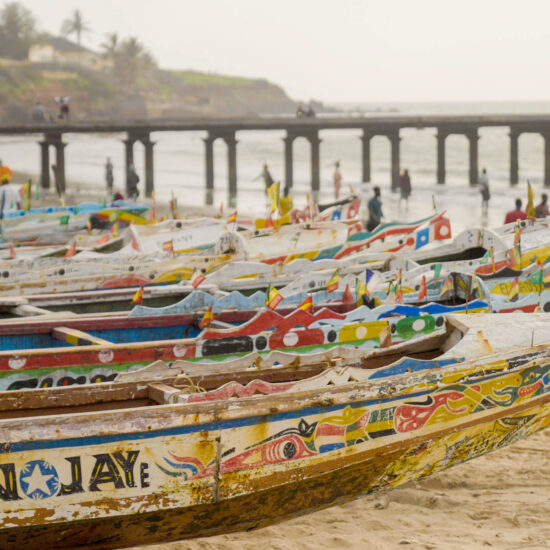
See It All – Safari Tour
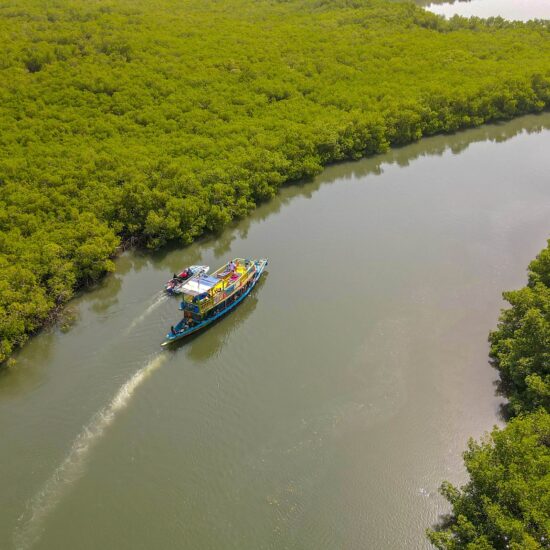
River Gambia Park
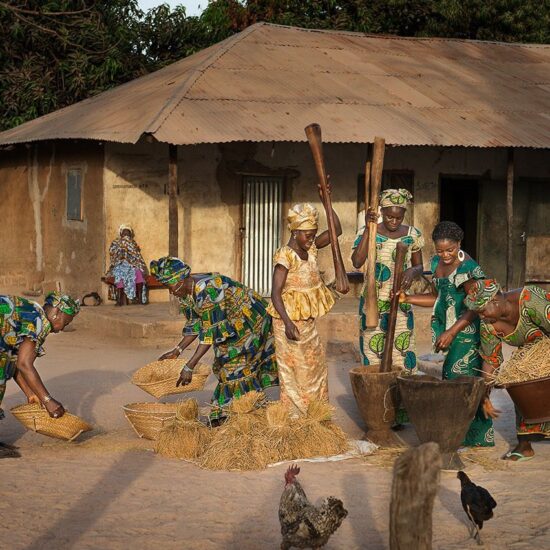
Experience local way of life
Explore eco friendly environments.
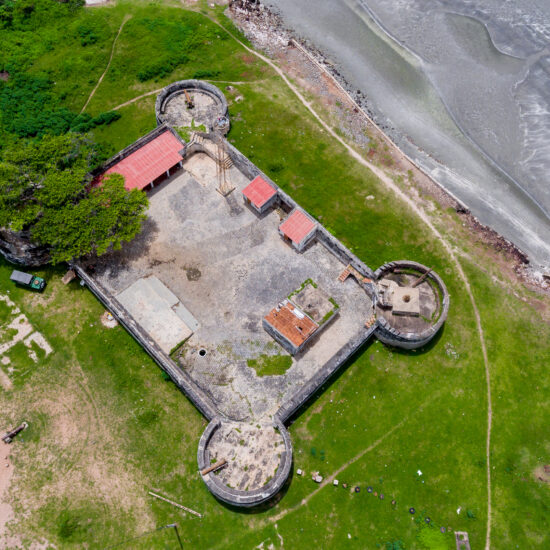
South Gambia
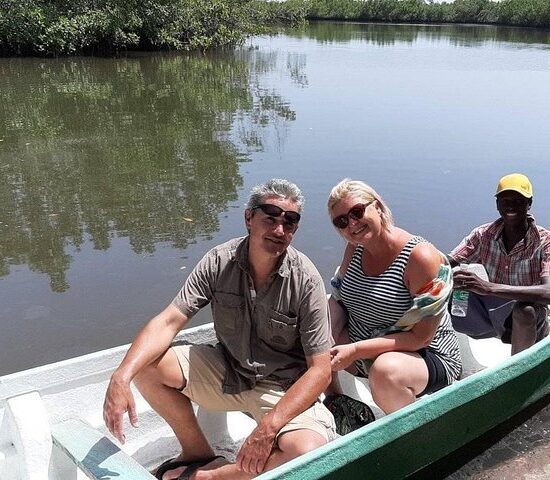
MAKASUTU FOREST
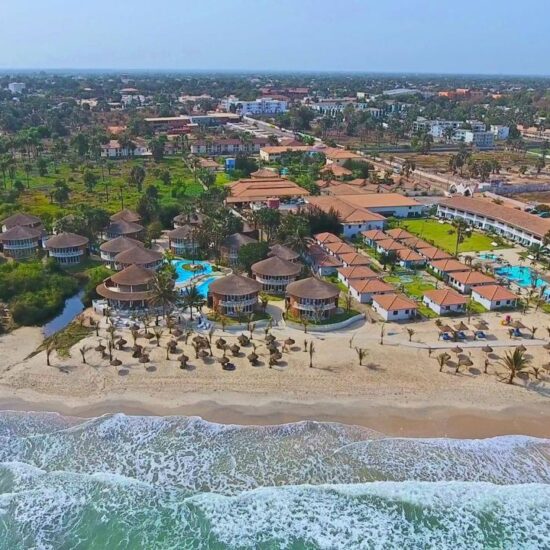
Genuine 4 Tours
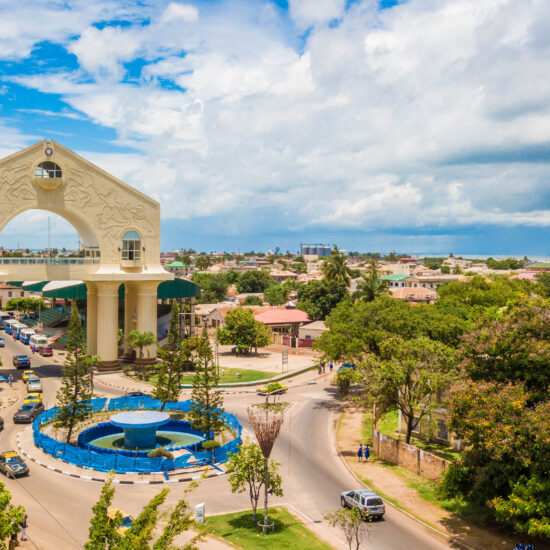
Banjul Tour
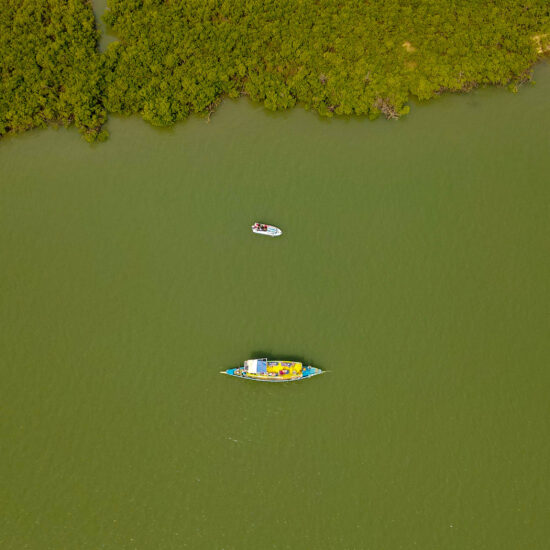
Gambia Tours
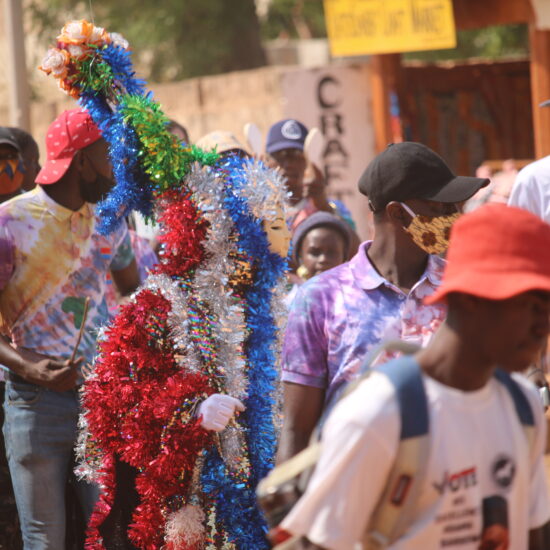
Janjangbureh
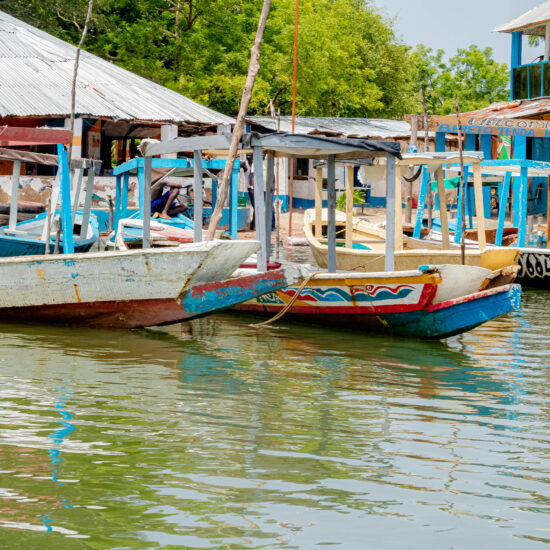
Full Day Tour
Choose the right destination for your vacation.
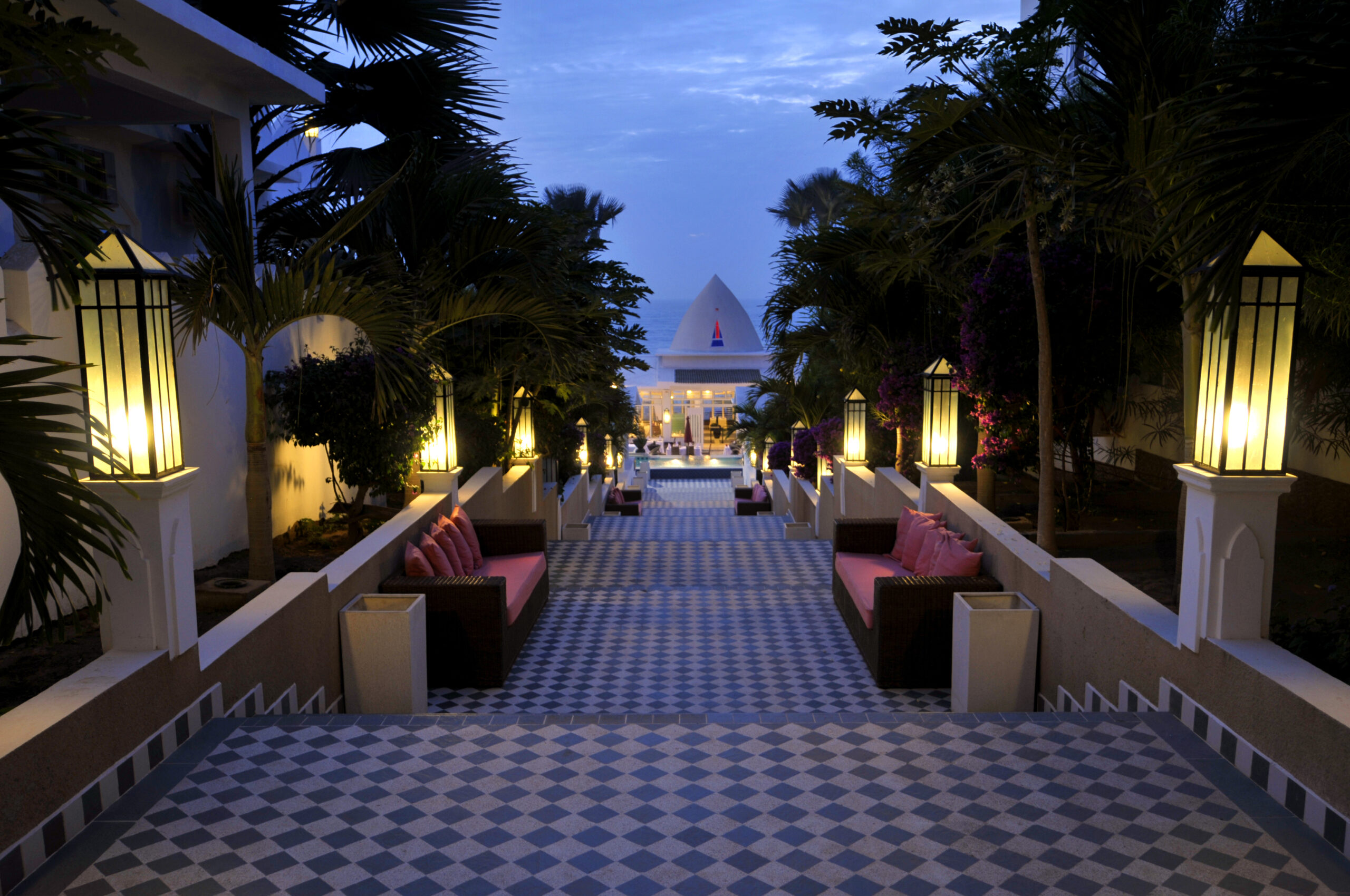
Nightlife Nightlife
Real experience.
Been there recently?
The Gambia is a popular and affordable all year round destination attracting tourists in search of sun, sand, sea, nature and varied cultural experience and of which this unique country has plenty.
Travel Experience
The Gambia has unique quality features over many other destinations. It is only six hours flight from major European destinations with no jet lag.
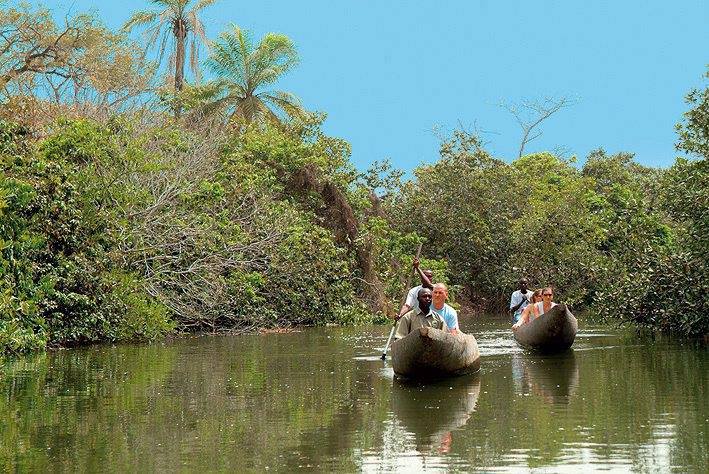
Home Stay Home Stay
Roots roots, conference experience.
Every modern architectural building must have a distinctive character, and for the Sir Dawda J. International Conference Center, the inspiration comes from a mixture of unique local and transcontinental geographical and cultural features
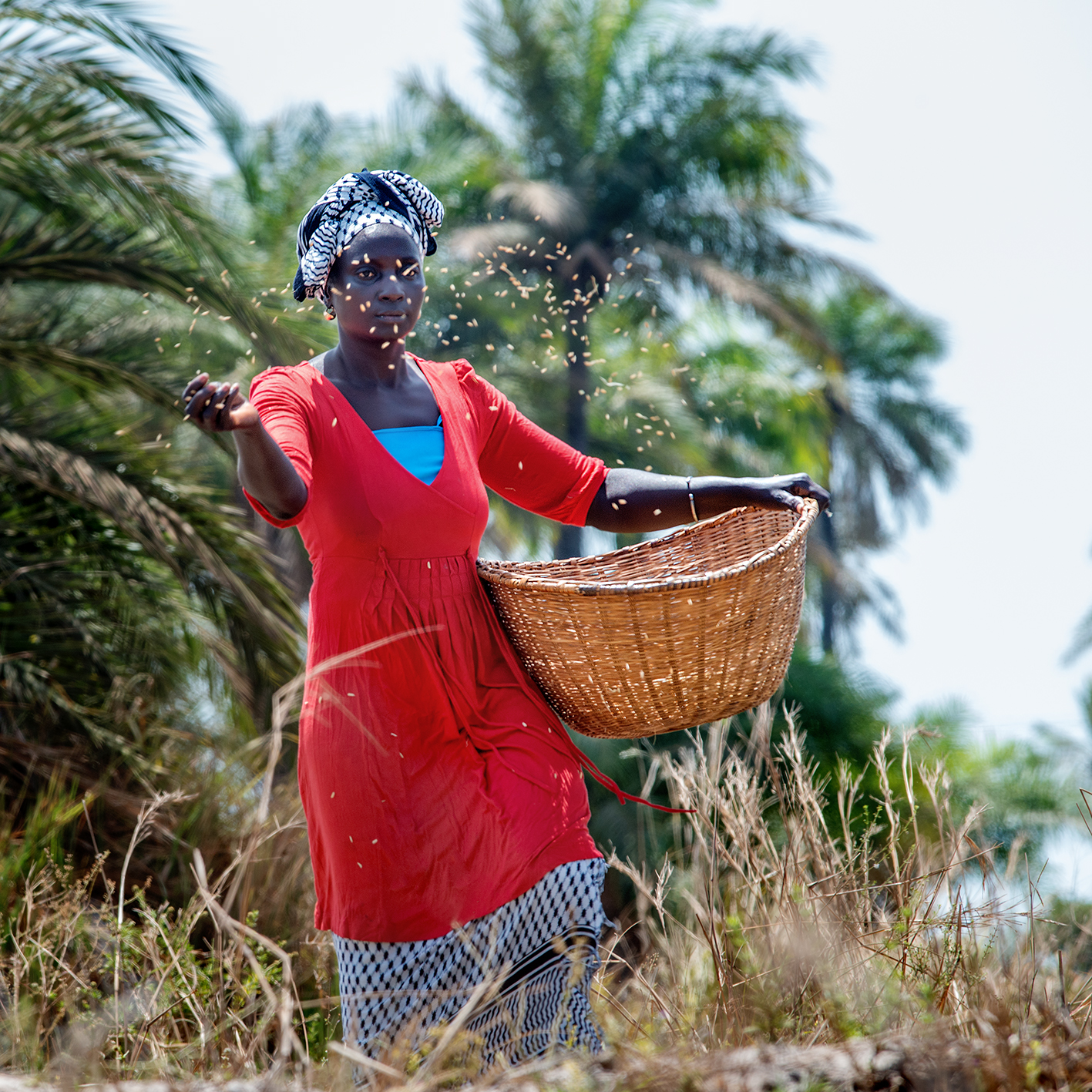
Traveller Essentials
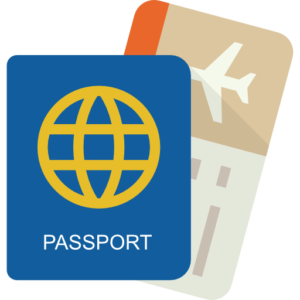
Travel Requirements
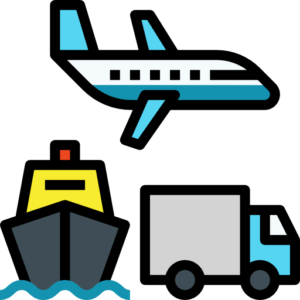
Getting to Gambia

Getting Around Gambia
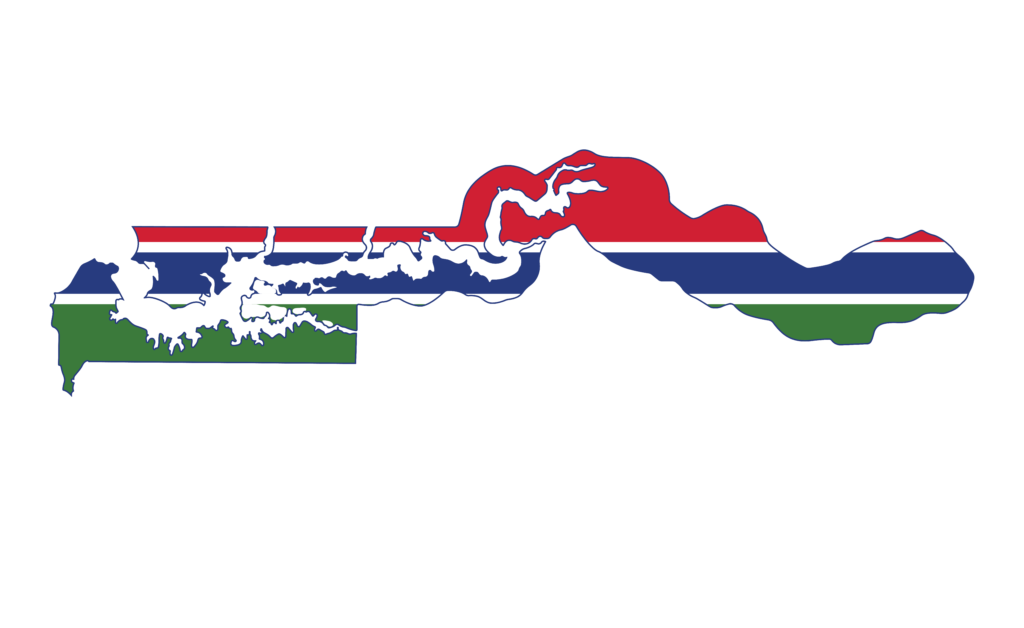
About The Gambia
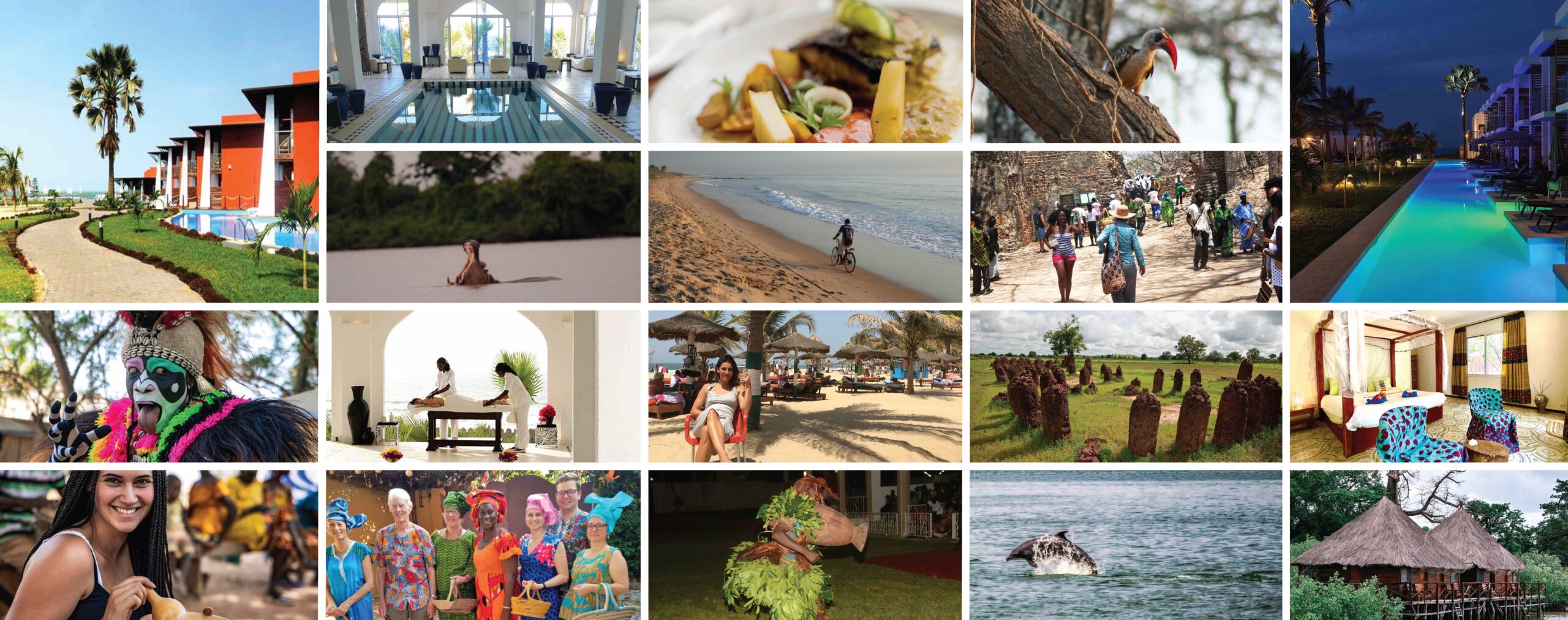
Subscribe To The Newsletter
Trending, best selling tours and fun destinations.
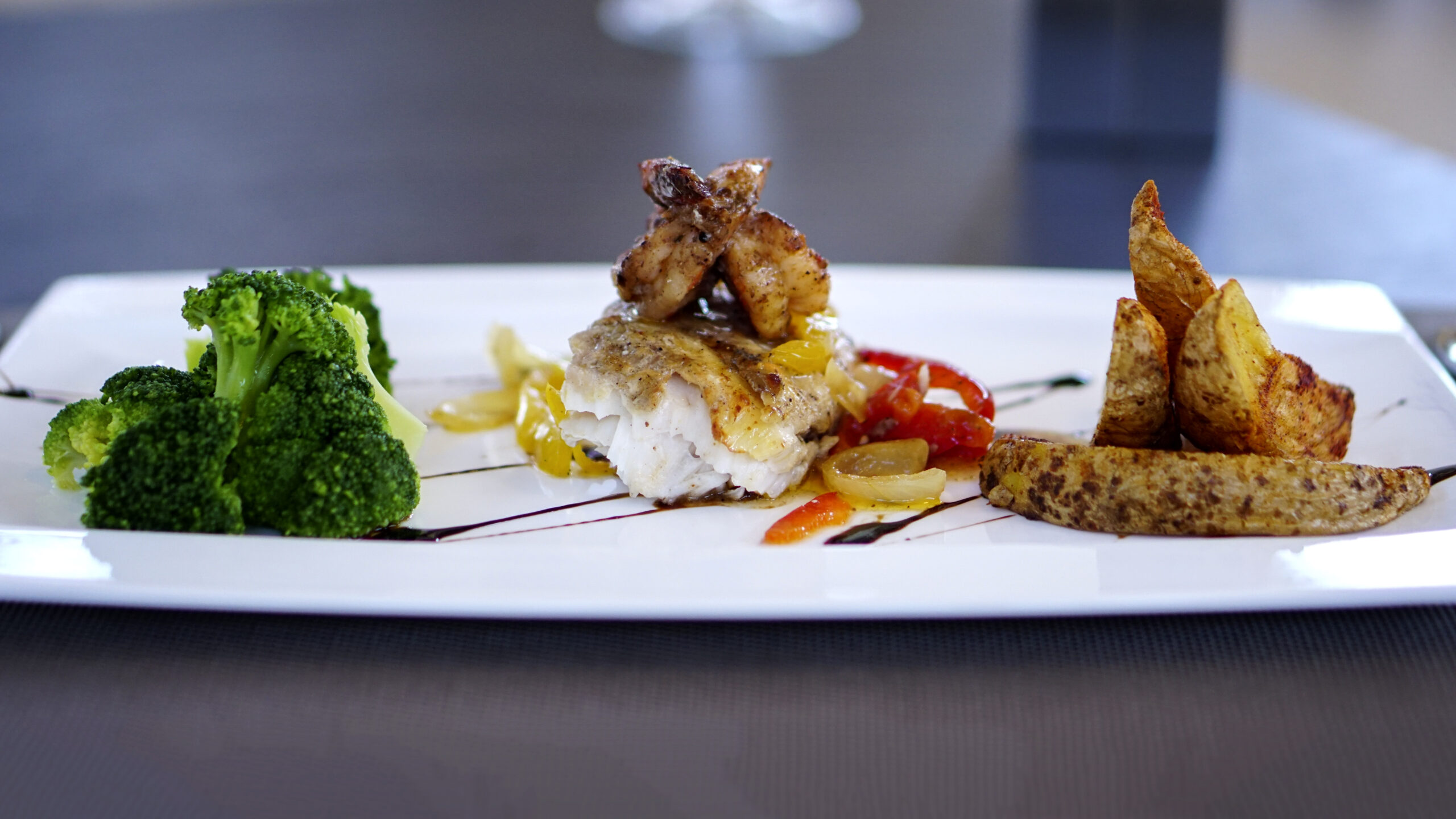
Gambian Cooking
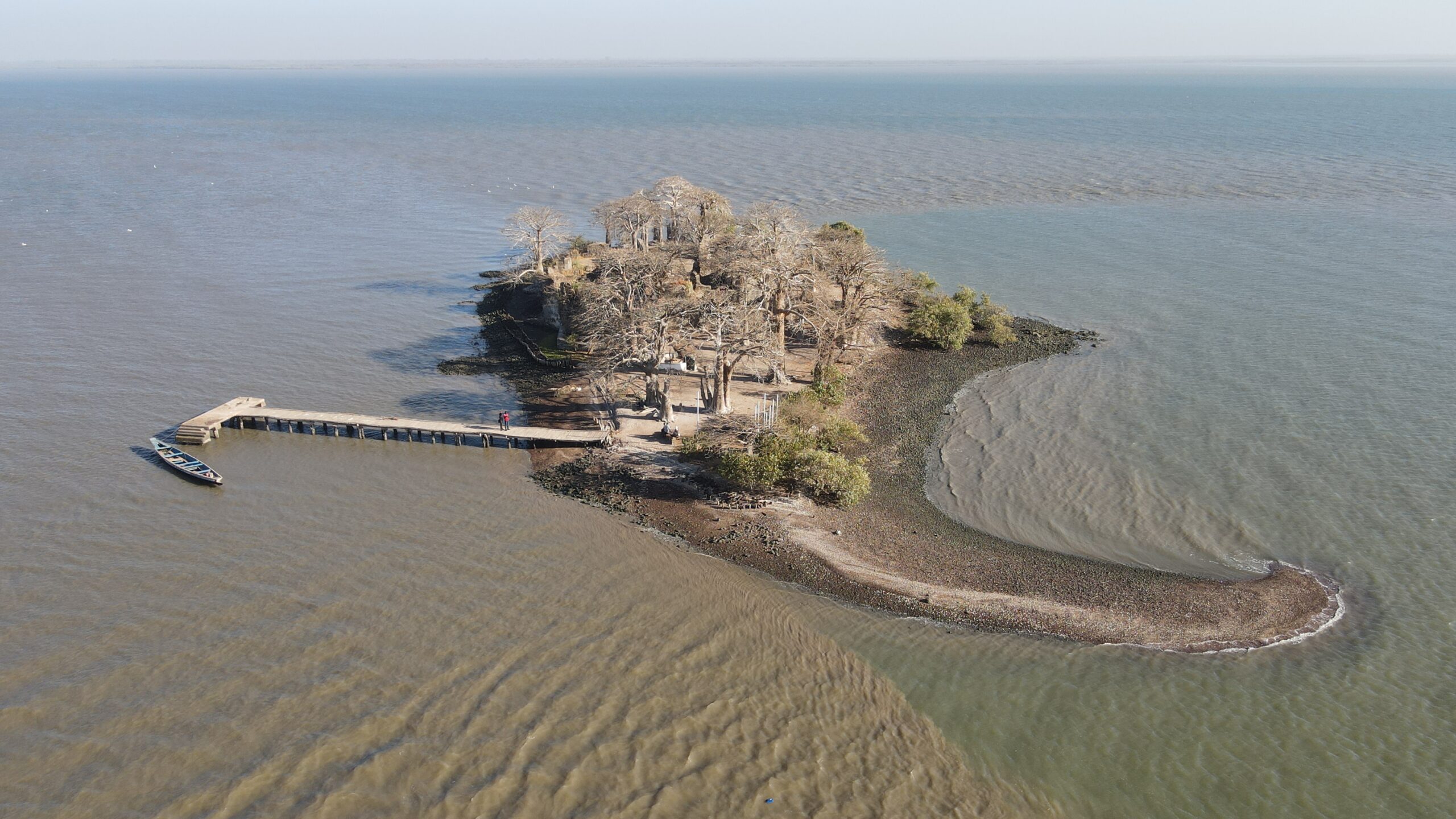
Kunta Kinteh Tours
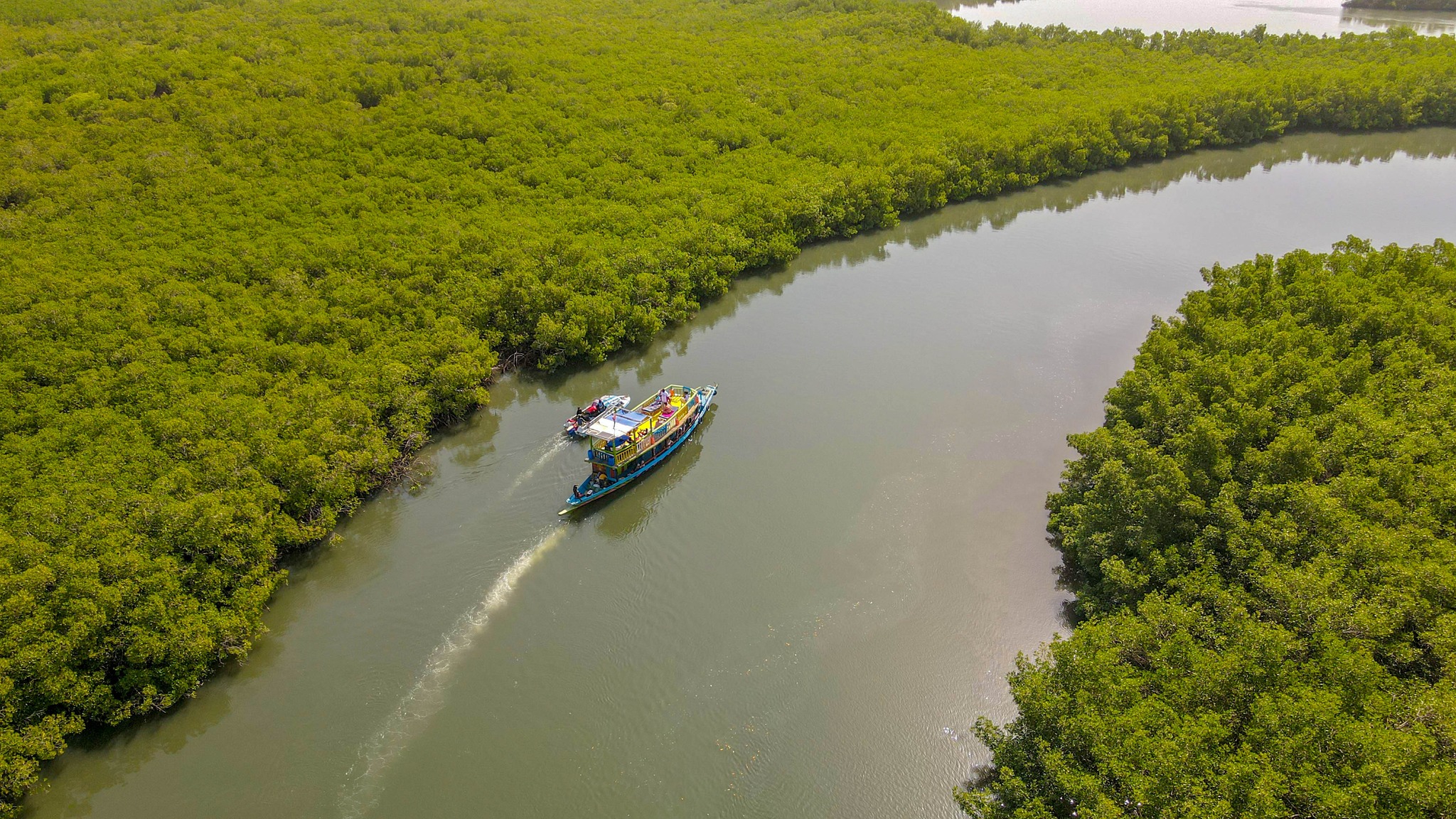
Get The Latest News On Gambia's Tourism
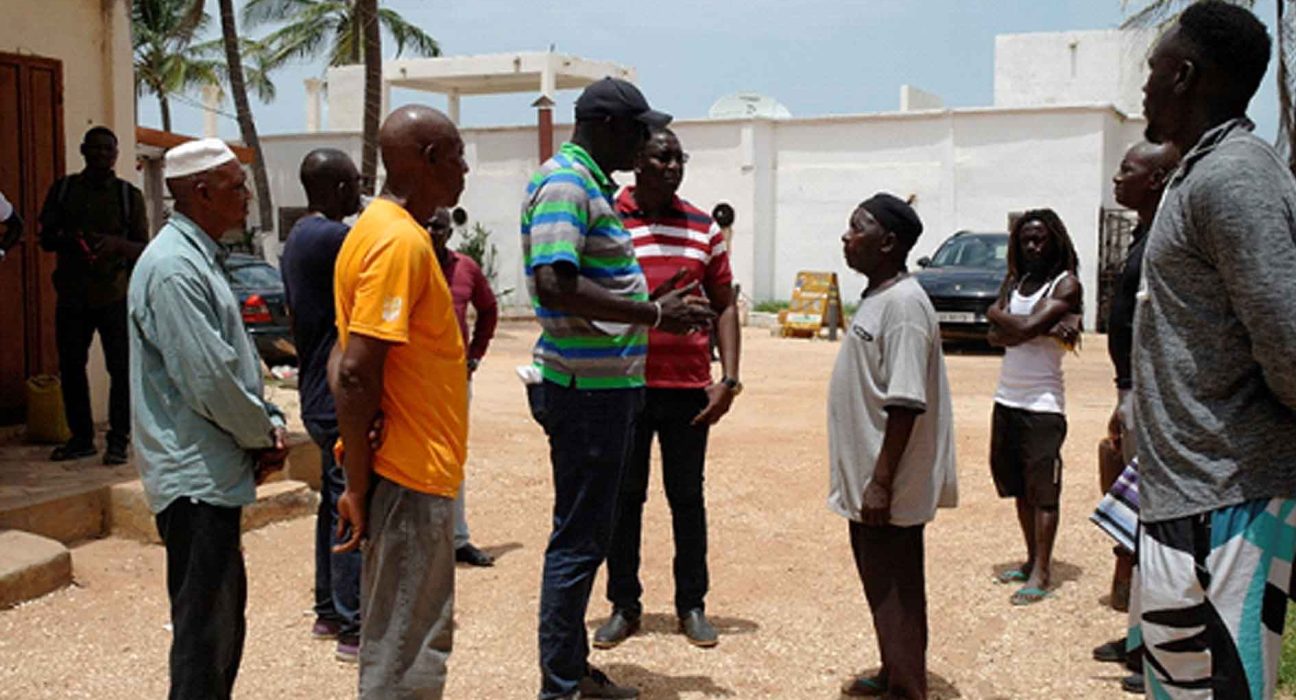
Tourism Minister Visits Tourism Development Area
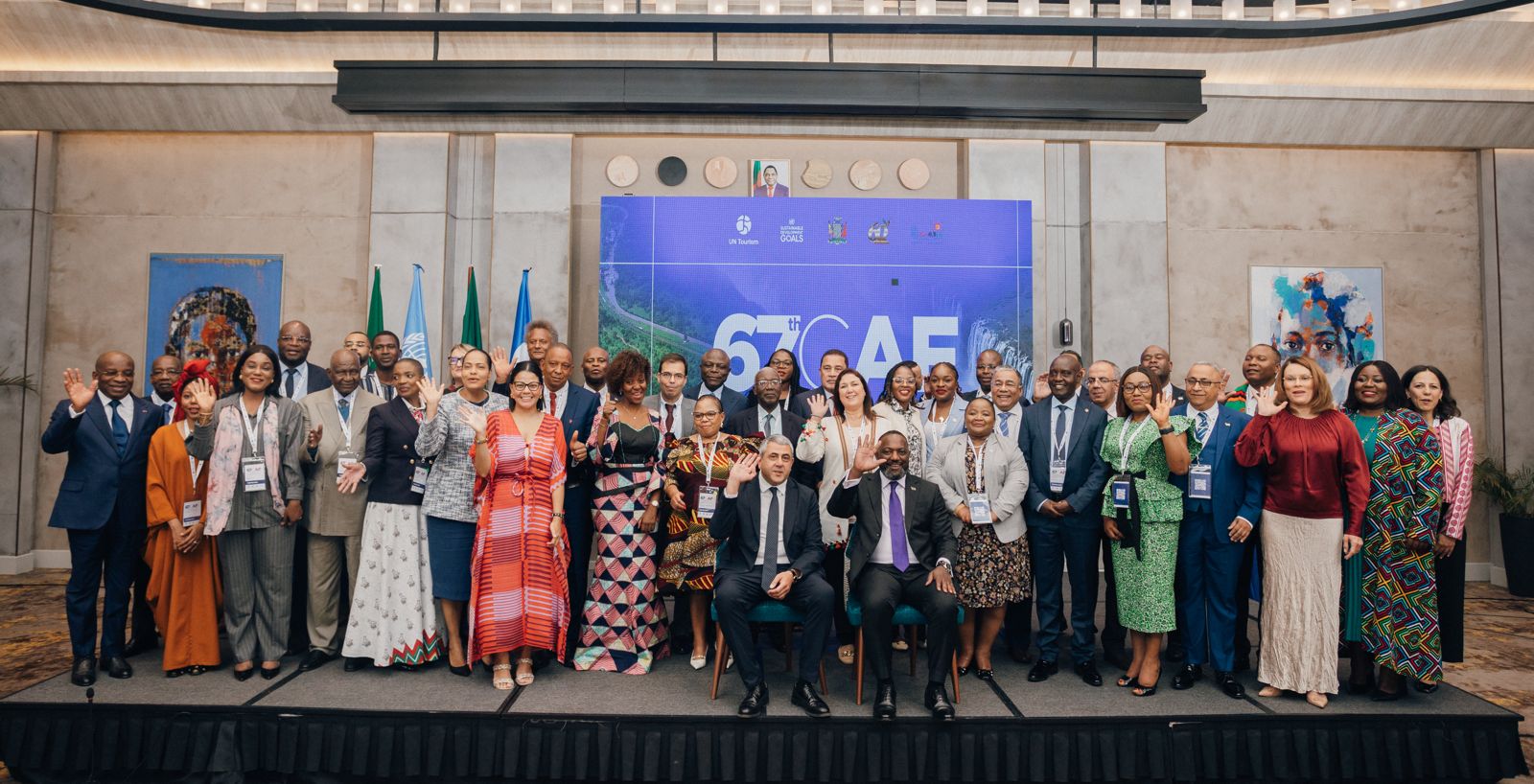
Gambia Tourism Board and Ministry of Tourism & Culture attend The 67TH Meeting of the UN Tourism Regional Commission for Africa and 2nd UN Tourism Regional Conference on Brand Africa
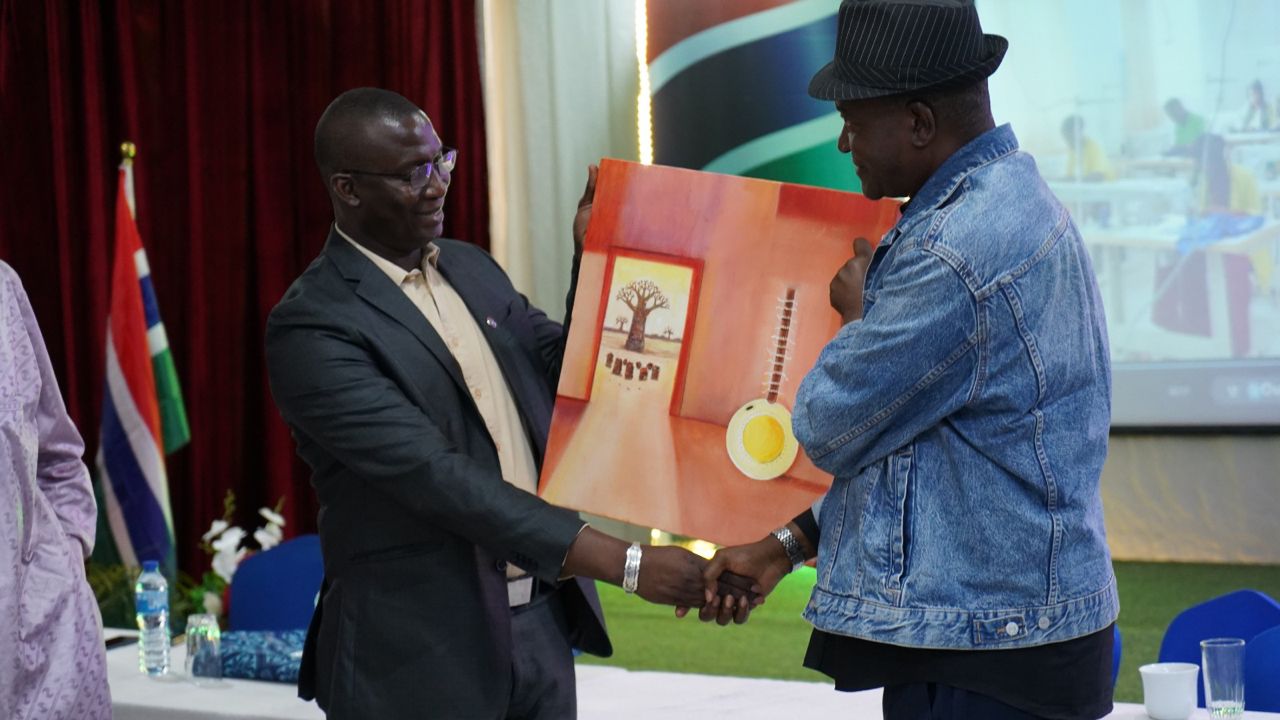
Gambia Tourism Board Honors Ambassador Ikechi Uko, Otunba Segun Runsewe and Two Nigerian Pilots for Contributions to Tourism Advocacy in Africa
Azerbaijan, gambia waive visas for diplomatic passport holders.
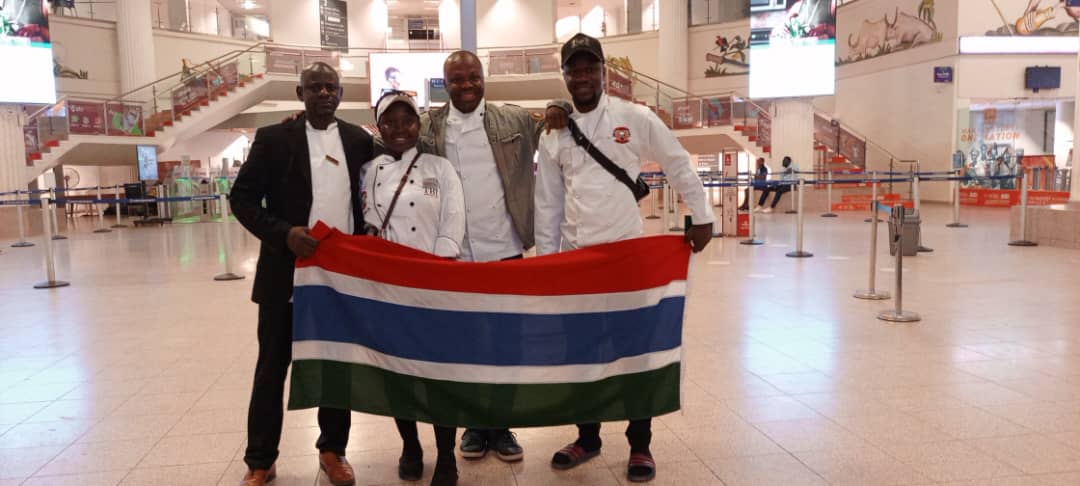
Gambia participates in the West African Food Festival
Oic gambia secretariat relocates to sir dawda international conference center.

COVID 19 PROTOCOLS ON ARRIVING PASSENGERS FOR REOPENING OF WINTER 2021 /2022 TOURIST SEASON
The world’s ten best ethical destinations 2021: special covid-19 edition, head office.
+220 4462496 / 1
[email protected]
Bartile Harding Highway, Kololi
Gambian Embassy UK
+44 7453 924160
[email protected]
57 Kensington Court, London W8 5DG, United Kingdom
GTBoard Madrid, Spain Office
+34 914361792
[email protected]
Main Street Victoria 8007
Brussels, Belgium
+32 26401049
[email protected]
Avenue Franklin D Roosevelt 126, 1050 Brussels, Belgium
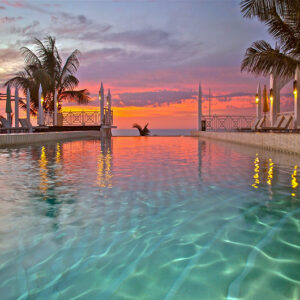
- New Administrative Building, The Quadrangle, The Gambia, West Africa
Gov Web Portal
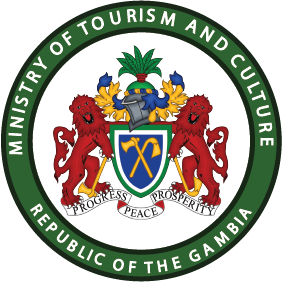
Ministry of Tourism Arts and Culture
- Vision and Mission
- Press Release

Laying the Groundwork to Expand and Diversify Tourism Products
Latest update.
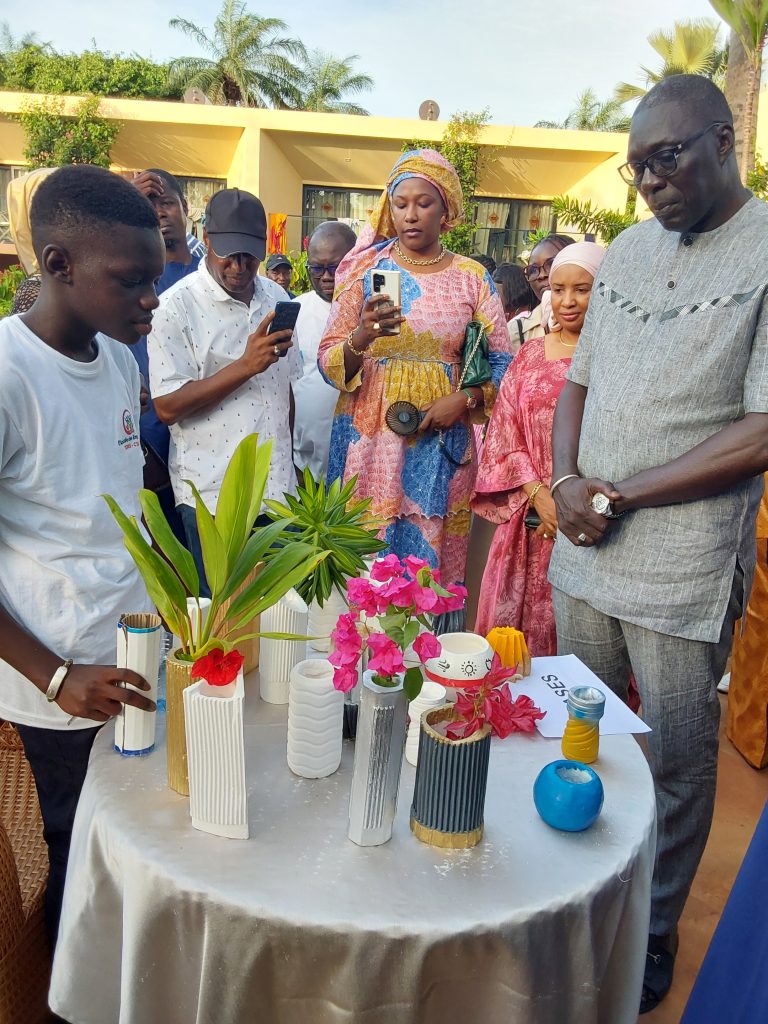
125 Senegalese Students Wrap up School Holiday…
Over the weekend, a group of about 125 Senegalese students wrapped up their nearly month-long school holiday break in The Gambia, known as Colonie De Vacances. They were lodged at…
Satellite Institutions
Gambia Tourism and Hospitability Institute
Gambia Tourism and Hospitality Institute (GTHI), was first established as The Gambia Hotel School (GHS) with support from the German Agency for Technical Cooperation (GTZ) and the World Bank, between 1979 and 1981.
Gambia Tourism Board
The Gambia Tourism Authority was established by an Act of the National Assembly in July 2001 to promote, develop, regulate and oversee the tourism sector in the Gambia. This is comprised of hoteliers, travel businesses and entertainment.
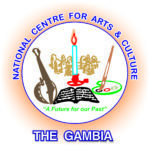
National Centre for Arts and Culture
The National Centre for Arts and Culture (NCAC) is a semi- autonomous institution established by an Act of Parliament in December 1989 to preserve, promote and develop Gambian arts and culture. The 1989 Act is now superseded by the NCAC Act of 2003.
Our Mission
To expand and diversify the tourism products such as the Gambia river, culture and heritage, environmental assets and wellness and sports tourism with the view to inclusively increase economic gains from tourism through sustainable tourism practices and regulations and fostering public private partnership for the benefit of the environment, businesses and the people.
The Gambia with its unique flora and fauna, the majestic River Gambia and the exceptional tolerance and hospitality of its people, is a prime destination of choice for an environmentally friendly, sustainable, and responsible tourism that encompasses valued experiences of natural and cultural heritage, wellness, quality products and services.
Service Board
Travel advisory, investments, announcements, news updates, 125 senegalese students wrap up school holiday in gambia.
Over the weekend, a group of about 125 Senegalese students wrapped up their nearly month-long school…
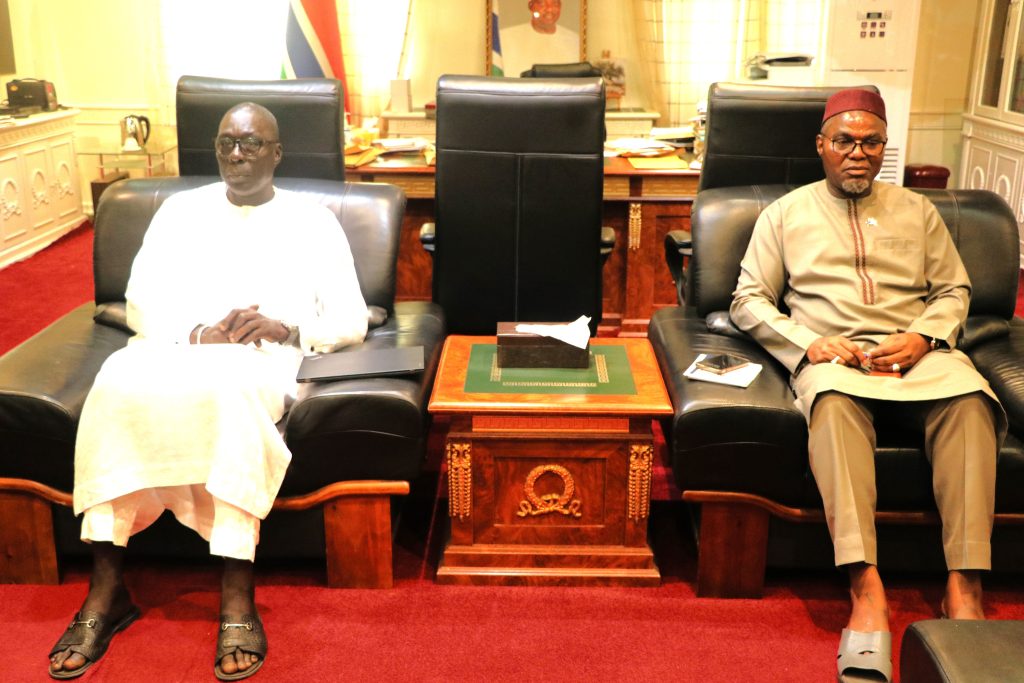
Tourism Minister Briefs Vice President Jallow on this Year’s Tourism Season
The Honorable Minister of Tourism, Arts and Culture, Abdoulie Jobe, accompanied by stakeholders in the tourism…
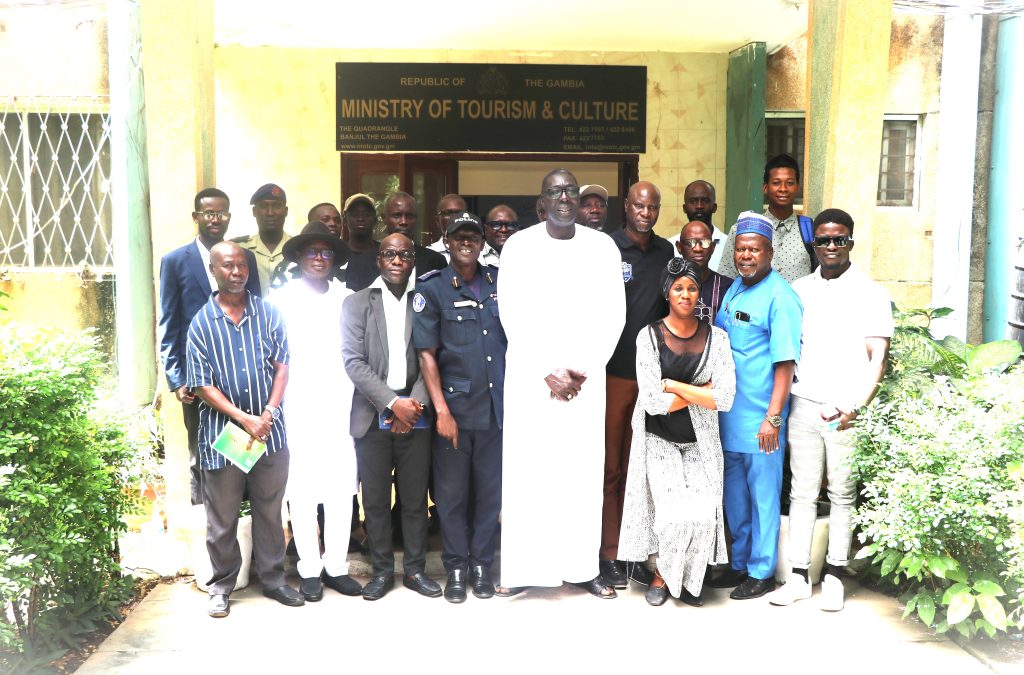
Preparation for Banjul New Year Cultural Festival Gathers Momentum
The Banjul New Year Cultural Festival Committee under the guidance of the National Centre for Arts…
IMPORTANT LINKS
Copyright © Ministry of Tourism & Culture | All Rights Reserved.

Home » Travel Guides » Gambia » 15 Best Places to Visit in The Gambia
15 Best Places to Visit in The Gambia
What brings most people to The Gambia are the beaches – and there are plenty to choose from.
Luxurious five-star resorts that cater to your every whim co-exist with fun and busy Mediterranean-style zones chock full of restaurants, bars, and nightclubs.
There’s also plenty of room for lazy days and long walks along palm-tree lined pristine coast line. Just take your pick. But there is so much more to Africa’s tiniest county!
Surrounded on all sides by Senegal, The Gambia is home to nature reserves, charming fishing villages, and a number of historic slave trade stations worth exploring.
If you’re a bird lover, it’s unlikely that you haven’t heard of this country as you can spot over 100 bird species on a single river cruise.
One of the best parts about The Gambia are the variety of day excursions that can be organized while you’re visiting.
Let’s explore the best places to visit in The Gambia :
1. Abuko Nature Reserve

Created in the early 20th century to protect a water collection point for nearby communities, Abuko Nature Reserve is The Gambia’s first reserve – officially formed in the 1960’s.
This area is rich in Gambian wildlife and is now the most visited tourist attraction in the country – with over 33,000 visitors each year.
Conservation efforts are on-going in this 260 acre reserve with three primate species here as well as antelope, porcupine, African palm civets, crocodiles, galagos, and almost 300 bird species.
A fun fact about Abuko is that it is the closest tropical forest to Europe.

The capital of The Gambia is Banjul. It’s a port city and is located on Saint Mary’s Island.
Originally called Bathurst after the Secretary of State for the British Colonies, Banjul is the government seat for the country.
For whatever reason, many tourists don’t give Banjul a second glance. But with the busy harbour, rich history, colonial architecture, and urban market, there is plenty to love about the city.
Enjoy the street hawkers from Senegal and Guinea and the shop keepers packed into old colonial trading housing all creating a chaotic vibrancy to the commercial district.
Be on the lookout for the traditional kirinting housing made of bamboo and traditionally owned by the poor farmers of the island.
3. The Albert Market

The activity hub of Banjul is the Albert Market.
It was created in the mid-19th century and named after Queen Victoria’s husband, Prince Albert.
Even back then it was full of bartering, haggling, and chaotic buying.
The market is exciting on its most boring day – which, really, is never!
You’ll find shoes, carved wood masks, houseware, electrical gadgets, shoes, fantastic fabrics, fruit, vegetables, beauty supplies, clothes, you name it.
Plan to spend a few hours to see it all and to really hone your negotiating skills.
If you’re looking for a local food experience, Albert Market has a number of street vendors and drink stalls to choose from.
4. Old Town

Head toward wide and welcoming Ma Cumba Jallow Street just west of the ferry terminal in Banjul and you’ll find an unruly assortment of fading colonial buildings and traditional Krio-style clapboard homes.
This is Old Town, which looks remarkably like Freetown in Sierra Leone because of the many Freetown families who settled here in the early 19th century.
There’s lots of history to admire as you walk through this wonderful section of the city.
5. Bijilo Forest Park

Bijilo Forest Park, or Monkey Park, is located in the coastal zone, just 11km from Banjul.
It’s a small reserve, relatively speaking, and is a point of pride for nearby locals.
The trails here are well maintained and take you through incredibly lush flora, a gallery forest, grass and low bush, on your way to the dunes.
The three primate species are the red colobus, vervet, and patas.
Tourists are encouraged not to feed the monkeys as they can get pretty cheeky!
Bird lovers will love the more than 100 species found in the park including osprey, bee-eaters, and francolin. The reviews seem to be consistent: a charming reserve that everyone falls in love with.
6. Brufut Beach

Sitting between the Kombo South District and the Atlantic Ocean are the Brufut resort and village.
Just 23km from Banjul the beach itself has terrific golden sand and lots of privacy.
To reach the beach you have to climb down the cliffs, using paths that are quiet steep in places.
Once you’ve arrived and staked your spot you’ll notice fishermen and women sparring fish, repairing nets, and waiting for a change in tide to take them back out on the water again.
Because it’s so uncrowded, it’s great for everything – sunbathing, water sports, walks along the sand, and cycling.
Visit nearby Sannah-Mentering, a sacred pilgrimage site for Gambian Muslims hoping for a blessing.
7. Janjangbureh

Also known as Georgetown, Janjangbureh is an old colonial administrative hub located on MacCarthy Island in the Gambia River.
A walk through town will take you to the old Commissioner’s Quarter.
This 200-year-old house was once inhabited by freed slaves.
There is little tourist infrastructure here, which will the town more or less desirable depending on the type of holiday you’re on, but the number one reason that most people come to Janjangbureh is for the bird watching.
Stay at a lodge or resort outside the city centre and spend a few days with the exotic birds of the area.
8. Sanyang Village and Beach
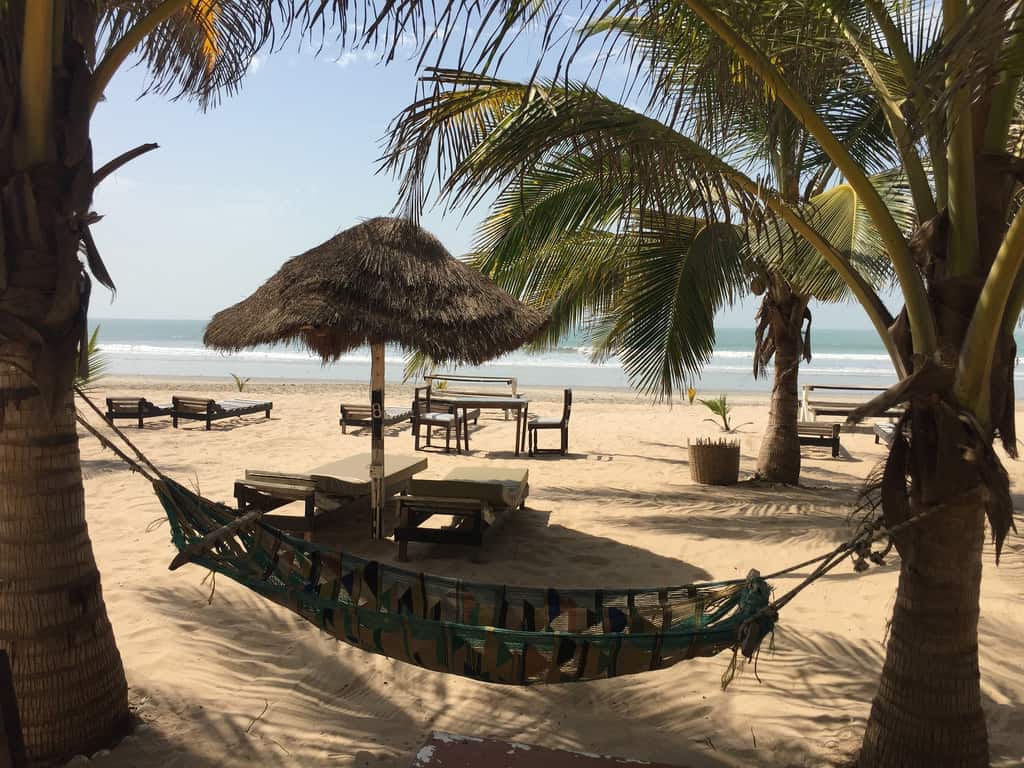
This is a sleepy beach village of about 7,000 people made up mostly of Wolof, Mandinka, Fula, and Jola tribes. Sangyang Beach, which is made up of Paradise, Osprey, and Pelican beaches, is considered by many to be the best beachfront in all of The Gambia.
It was a popular attraction long before the tourist trail made its way there and has a long stretch of remote shore, surrounded by mangroves and lagoons.
Perfect for those who want to get away from the crowds. The main economy is fishing and as such there is a fantastic fish market in the village.
Great for people watching and meeting the locals. As a bonus, the area has many shaded footpaths for nature trekking.
9. National Museum of Gambia

Once the white only Bathurst Club, this historic building now houses the National Museum of Gambia.
You’ll find a wide range of exhibits and displays here, including traditional Gambian life, the colonial history of Bathurst, information on the Senegambia stone circle sites, music, and dance.
Though it is small, the museum is well planned to reveal the rich culture of this wonderful country. You won’t be able to miss the giant Kankurang mask hanging in the main hall.
This powerful ritual mask is used during rites of passage and coming of age.
10. Wassu Stone Circles

Located in the Central River Region, these circles are believed to be the burial sites of ancient kings and chiefs.
Dated to 750-1000 AD, the stones and layouts vary from 4-6 metres in diameter, with anywhere from ten to 20 stones each.
Each stone has an average height of six feet and many tourists and archaeologists have puzzled over their origins and true meaning.
Though the biggest concentration of stone circles is in the Wassu area, there are hundreds of circles throughout the country.
Declared a UNESCO World Heritage Site in 2006, local legend has it that if anyone disturbs the stones they will be cursed – a good clue as to why they have remained undisturbed for so long.
11. The Kachikally Crocodile Pool

Sitting on nine acres in Bakau Old Town is the Kachikally Crocodile Pool.
Locals believe in the healing powers of the water and it’s a popular place to come for a blessing.
There are about 80 crocodiles that call the pool home and a cool dozen are usually immediately visible when you arrive.
Also on site are an ethnography museum, souvenir shop, café, and nature trail.
12. Makasutu Culture Forest

This is a private woodland reserve dedicated to ecotourism in the Kombo Central District.
With over 1,000 acres, the protected area is a pristine forest of riverine, palm and hardwood trees, mangrove creeks, salt flats, and savanna.
In the 1990’s two Britons stepped in and began conservation efforts on this almost bare forest.
This sacred land is now a popular day excursion that gives visitors a chance to see one of the most beautiful forested areas in The Gambia.
13. The Gambia River

There’s a popular quote that helps to explain the relationship between the country and the river: “The Gambia River is the Gambia and the Gambia is the river Gambia.”
The country exists as two strips of land on either side of the river and it’s definitely the dominate feature of the country.
It’s become a popular tourist destination as it provides access to the interior as well as to Senegal and Guinea.
A river boat cruise will bring you to some interesting wildlife, historic slave trade stations, and beautiful countryside.
14. Serrekunda

The largest town in The Gambia is Serrekunda, a market town with a population of just under half a million people.
This is where you’ll find the Batik Factory, where tie-dyed and batik fabrics are made.
It’s the perfect place for beautiful and personal souvenirs for home.
The national pastime of the Senegambia region is wrestling and in Serrekunda they take it quite seriously.
Each wrestler has a small group of drummers who amp up the crowd with energetic beats before a bout. T
he rules are pretty loose, but if it gets too dirty, someone will step in and stop the bout. Usually!

The Gambian coast is full of fishing villages along the coast. The busiest and most popular is the village of Tanji.
Everything happens right on the beach, which doesn’t make for good swimming, but does make for dramatic people watching.
Enjoy the fish market and the fish-smoking centre right in the heart of it all.
The Tanji Village Museum educates visitors on Gambian traditions and lifestyle.
Bird lovers will enjoy the Tanji River Bird Reserve – six square miles of savannah habitats and marine wetland along the river.
There are over 300 bird species here include 34 raptors. You’re also likely to see bushback, hyena, green monkeys, and the red colobus.
If you’ve got the time, be sure to check out the Bijol Islands, where they have over 20,000 birds and seals and whales have been spotted from time to time.
15 Best Places to Visit in The Gambia:
- Abuko Nature Reserve
- The Albert Market
- Bijilo Forest Park
- Brufut Beach
- Janjangbureh
- Sanyang Village and Beach
- National Museum of Gambia
- Wassu Stone Circles
- The Kachikally Crocodile Pool
- Makasutu Culture Forest
- The Gambia River

Must-see attractions in The Gambia
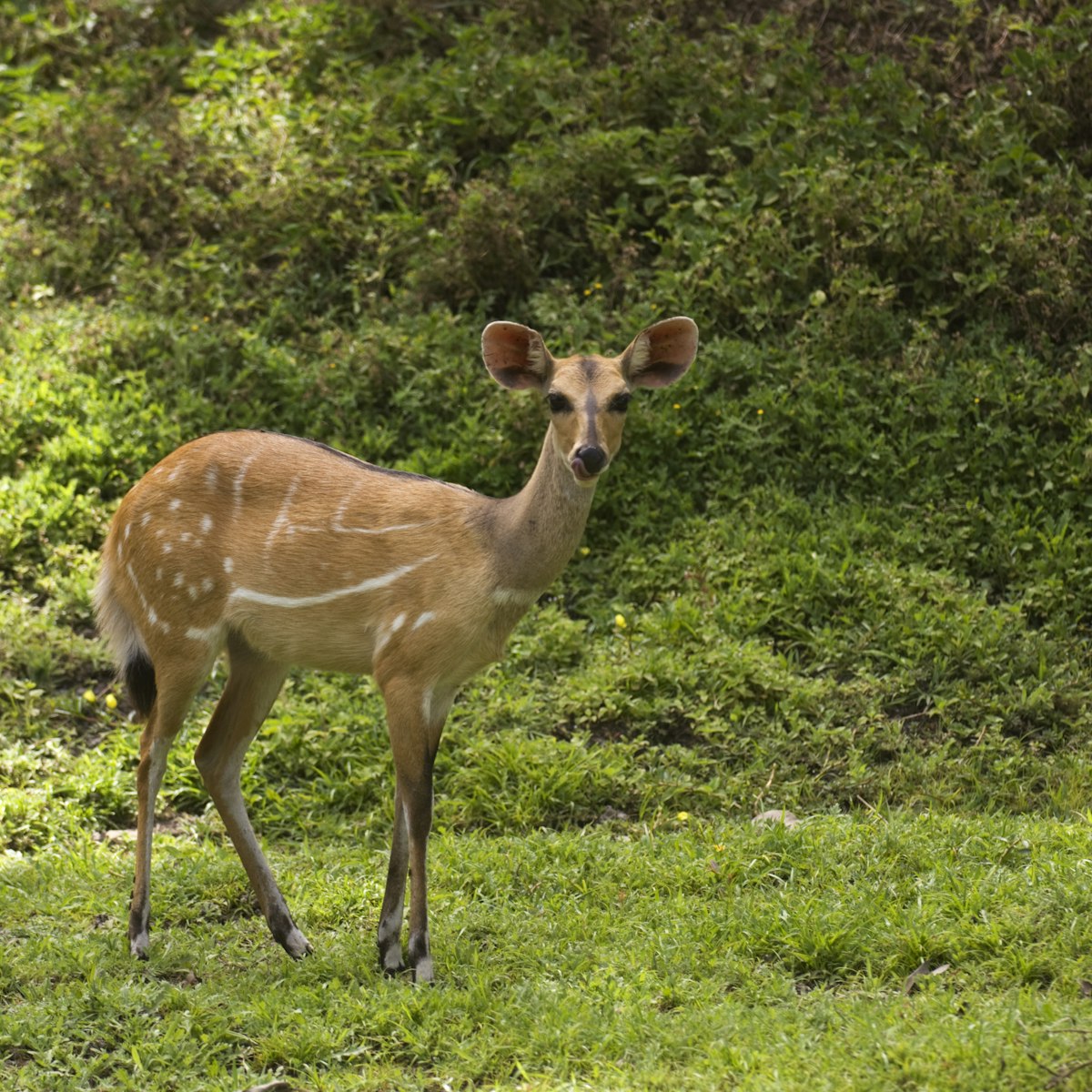
Abuko Nature Reserve
Abuko is rare among African wildlife reserves: it's tiny, it's easy to reach and you don't need a car to go in. With amazing diversity of vegetation and…

Wide Open Walls
Two huge ibex grazing amid swirling waves, a blue tattooed lion, and a lovestruck blacksmith are just a few of the striking images awaiting visitors who…
Chimpanzee Rehabilitation Project
This project forms the beating heart of River Gambia National Park. Comprised of so-called Baboon Island and several smaller islands, this is one of the…
Bijilo Forest Park
Serekunda & Atlantic Coast Resorts
This small 51-hectare reserve makes for a lovely escape. A series of well-maintained walking trails (ranging from 900m to 1400m) takes you through lush…
Kachikally Crocodile Pool
One of The Gambia's most popular tourist attractions is a sacred site for locals. As crocodiles represent the power of fertility in Gambia, women who…
St Joseph's Adult Education & Skills Centre
Tucked away inside an ancient Portuguese building, this centre has provided training to disadvantaged women for the last 20 years. Visitors can take a…
Makasutu Culture Forest
Like a snapshot of The Gambia, Makasutu Culture Forest bundles the country's array of landscapes into a dazzling 1000-hectare package. The setting is…
Wassu Stone Circles
Archaeologists believe the Wassu stone circles are burial sites constructed about 1200 years ago. Each stone weighs several tonnes and is between 1m (3…
Tanji Fish Market
Colourful pirogues roll in the waves, women ferry fish elegantly to shore atop their heads, and crowds swarm the beachfront at this charismatic fish…

Albert Market
Since its founding in the mid-19th century, the Albert Market, an area of frenzied buying, bartering and bargaining, has been Banjul's main hub of…
Fort James was an important British colonial trading post from 1661 and the departure point of vessels packed with ivory and gold, as well as slave ships…
West from the ferry terminal towards the wide Ma Cumba Jallow St (Dobson St) is a chaotic assembly of decrepit colonial buildings and Krio-style clapboard…
Tunbung Arts Village
Quirky and wonderful, Tunbung Arts Village is a ragged assembly of skewed huts, wildly painted walls and random sculptures that peer out behind walls and…
Tanji Village Museum
This fascinating cultural museum presents Gambian nature and life scenes by recreating a traditional Mandinka village, where you can peer into huts and…
Tanji River Bird Reserve
The Tanji River Bird Reserve is an area of dunes, lagoons and woodland, and contains Bijol Island, a protected breeding ground for Caspian terns. True to…
National Museum of Albreda
This small museum focuses on slavery in The Gambia, with displays detailing the gruesome treatment these human captives suffered. There's also a room…
Bao Bolong Wetland Reserve
Located on the north bank of the Gambia River, Bao Bolong Wetland Reserve contains savannah woodland, mangrove forest and salt marsh, and is famed for its…
Bolong Fenyo Community Wildlife Reserve
This 320-hectare reserve encompasses a mix of savanna and wetland habitats, including a freshwater lagoon, and has exceptional birdlife, with some 150…
This massive 36m-high gateway, built to celebrate the military coup of 22 July 1994, grants excellent views. There's also a cafe and a small museum that…
National Museum
Well-presented, if slightly dusty, displays of historical and cultural artefacts, including musical instruments, agricultural tools and ethnographic items…
Botanic Gardens
Bakau's botanic gardens were established in 1924 and offer shade, peace and good bird-spotting chances. It's a small space – just 1.5 hectares.
Sakura Arts Studio
Art lovers should visit Njogu Touray's Sakura Arts Studio for a private viewing of the acclaimed painter's colourful works.
July 22 Square
The quadrangular July 22 Square contains a World War I memorial and a fountain dating from the 1930s.
A useful landmark on Karaiba Ave, this is the main mosque in the city.
Kiang West National Park
Spread across 115 sq km on the south bank of the river, Kiang West National Park contains an impressive array of plant and animal life. There are more…
More destinations you need to see

- 1.1 Climate
- 1.2 History
- 1.3 National holidays
- 1.5 Tourist information
- 3 Other destinations
- 4.2 By plane
- 4.5 By boat
- 5.2 By taxi
- 5.4 By bike
- 5.5 By thumb
- 5.6 By boat
- 5.7 Guided tours
- 9.3 Souvenirs
- 9.4 Markets
- 14 Stay safe
- 15 Stay healthy
<a href=\"https://tools.wmflabs.org/wikivoyage/w/poi2gpx.php?print=gpx&lang=en&name=Gambia\" title=\"Download GPX file for this article\" data-parsoid=\"{}\"><img alt=\"Download GPX file for this article\" resource=\"./File:GPX_Document_rev3-20x20.png\" src=\"//upload.wikimedia.org/wikipedia/commons/f/f7/GPX_Document_rev3-20x20.png\" decoding=\"async\" data-file-width=\"20\" data-file-height=\"20\" data-file-type=\"bitmap\" height=\"20\" width=\"20\" class=\"mw-file-element\" data-parsoid='{\"a\":{\"resource\":\"./File:GPX_Document_rev3-20x20.png\",\"height\":\"20\",\"width\":\"20\"},\"sa\":{\"resource\":\"File:GPX Document rev3-20x20.png\"}}'/></a></span>"}'/> The Gambia is a small, narrow country along the length of the Gambia River in West Africa , almost completely surrounded by Senegal . Besides beaches and wildlife, The Gambia is known for the town of Juffureh , made famous by Alex Haley's Roots . It is known as the Smiling Coast.
The Gambia essentially consists of the flood plain of the Gambia River flanked by some low hills — the highest point is just 53 m above sea level, and it is less than 50 km across at its widest point.
Tropical; hot, rainy season (June to November); cooler, dry season (November to May); Natural hazards : drought (rainfall has dropped by 30% in the last 30 years).
Before the arrival of the Europeans, oral traditions preserved most of The Gambia's history. The Wassu Stone Circles are thought to be evidence of early settlement, however not much is known about it. The territory of present-day The Gambia became part of the Mali Empire in the 14th century.
Historically, culturally, and linguistically tied to Senegal, The Gambia was split from its neighbor in the 18th century by European powers. Most of the region was taken over by France, but a narrow piece of land around The Gambia River was ceded to Great Britain. This small area eventually became The Gambia.
The Gambia gained its independence from the UK on 18 February 1965. A constitution was written on 24 April 1970, before being suspended in July 1994 and subsequently rewritten and approved by national referendum on 8 August 1996. It was re-established in January 1997.
The Gambia formed a short-lived federation of Senegambia with Senegal between 1982 and 1989. In 1991 the two nations signed a friendship and cooperation treaty. A military coup in 1994 overthrew the president and banned political activity, but a new 1996 constitution and presidential elections, followed by parliamentary balloting in 1997, completed a nominal return to civilian rule. Elections have continued ever since, but with government intimidation and detention of opposition leaders, they aren't completely democratic.
After ruling with an iron fist for over 20 years, during which he withdrew The Gambia from international organisations such as the Commonwealth of Nations and the International Court of Justice (ICJ), Yahya Jammeh eventually lost the election to Adama Barrow in 2016. Although Jammeh initially refused to concede defeat, Barrow escaped to Senegal, and Jammeh was eventually forced to step down and go into exile under the threat of military intervention from The Gambia's neighbours. Since coming to power, Barrow has attempted to roll back some of Jammeh's excesses, with The Gambia having since re-joined the ICJ and the Commonwealth.
National holidays
The Gambia celebrates its independence day on 18 February. This small country gained its independence in 1965. There is also the Muslim festival of Eid which is celebrated by virtually all Gambians and is a 2- to 3-day event during which up to 250,000 animals are slaughtered to provide food for the feast. It is also a time when Gambians, especially women, dress in their finest regalia and buying new dresses at up to D3,000 ( Gambian dalasi ).
A variety of ethnic groups live in The Gambia, each preserving its own language and traditions. The Mandinka ethnicity is the largest, followed by the Fula, Wolof, Jola, Serahule, Serers and the Bianunkas. The Krio people, locally known as the Aku , constitute one of the smallest ethnic minorities in The Gambia. They are descendants of the Sierra Leone Creole people and have been traditionally concentrated in the capital.
Tourist information
- Visit the Gambia tourism website

- 13.453056 -16.5775 1 Banjul — capital
- 13.310262 -14.23 2 Basse Santa Su
- 13.249772 -16.212593 3 Bintang
- 13.266667 -16.65 4 Brikama
- 13.383333 -16.75 5 Brufut
- 13.183333 -16.766667 6 Gunjur
- 13.534131 -14.766153 7 Janjanbureh
- 13.338611 -16.3825 8 Juffureh
- 13.433333 -16.666667 10 Serekunda
- 13.35 -16.783333 11 Tanji
- 13.366667 -16.65 12 Yundum
Other destinations
- 13.395833 -16.645556 1 Abuko Nature Reserve — tiny reserve near the beaches with shady paths to get close to monkeys, bushbucks, chameleons, & crocodiles.
- 13.516667 -15.866667 2 Bao Bolong Wetland Reserve — mixed patched of thick forest and swamp most noteworthy for its migratory birds but also home to dugongs, otters, hogs, antelope, & hippos.
- 13.383333 -15.916667 3 Kiang West National Park – one of the largest and most important wildlife reserves in the country.
- 13.3175 -16.3614 4 Kunta Kinteh Island , a remainder from the slave trade and a UNESCO World Heritage site
- Makasutu Cultural Forest — a large eco-tourism project near the beaches popular as a package day trip with game drive, boat ride, & performances by locals.
The Gambia has two sites on the UNESCO World Heritage List.
The Gambia is becoming a popular vacation destination for Northern Europeans. Therefore, many charter and holiday operators offer reasonable airfare and accommodation if desired.
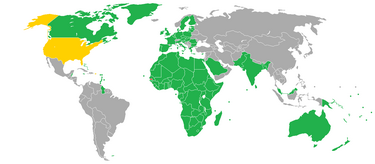
Tourists from ECOWAS, Commonwealth countries and other countries not listed below, or tourists from all nations arriving in The Gambia on a charter flight may enter visa-free for up to 90 days. ECOWAS nationals may also enter with passport or Biometric ID card.
Nationals of Egypt , Austria , France , Portugal , Spain , Switzerland , Turkey , United States , Armenia , Azerbaijan , Belarus , Bosnia and Herzegovina , Czech Republic , Estonia , Georgia , Kazakhstan , Kyrgyzstan , Latvia , Lithuania , Moldova , Romania , Russia , Slovenia , Slovakia , Tajikistan , Turkmenistan , Ukraine and Uzbekistan need a visa to enter unless they are travelling as tourists on a charter flight.
Nationals of Kenya , Namibia , Tunisia , Uganda , Zimbabwe , China , Hong Kong , India , Japan , Macau , Myanmar , Mongolia , Thailand , Vietnam , Argentina , Brazil , Chile , Colombia , Costa Rica , El Salvador , Guatemala , Honduras , Mexico , Nicaragua , Panama , Paraguay , Peru and Uruguay may enter The Gambia visa-free for up to 90 days on the condition that they obtain an entry clearance from the Gambian Immigration prior to travel, unless they are travelling as tourists on a charter flight.
Nationals of Algeria , Angola , Burundi , Cameroon , Central African Republic , Chad , Comoros , Republic of the Congo , Democratic Republic of the Congo , Djibouti , Equatorial Guinea , Eritrea , Ethiopia , Gabon , Libya , Madagascar , Mozambique , Rwanda , Somalia , South Africa , South Sudan , Sudan , Bahamas , Haiti , Jamaica , Dominican Republic , Afghanistan , Bahrain , Iran , Iraq , Israel , Jordan , Kuwait , Lebanon , Oman , Pakistan , Palestine , Qatar , Saudi Arabia , Syria , Yemen , East Timor , Indonesia , Mauritius , the Philippines , South Korea , Sri Lanka and Seychelles require a visa, and/or an entry clearance from the Gambian Immigration prior to travel.
Visas can be obtained at The Gambian High Commission in Dakar , Senegal . Single entry visas cost USD100, XOF35,000 (about USD69, so a better deal!) and multi-entry visas for a three-month period cost XOF30,000.
As of April 2023 visa for most nationalities can be obtained at Karag, the northern border with Senegal for USD100. It will be valid for three months and multiple entries. They take cash only and there are no ATM's at the border. Travelers will have their fingerprints and photograph taken.
Information about obtaining a visa on arrival is available at the website of The Gambia Immigration Department [ dead link ] .
A list of countries whose citizens can enter without a visa is available at the website of The Gambia Tourism Board .
Banjul ( BJL IATA ) is the only international airport in The Gambia. Vueling , a low-cost airline, operates regular flights to/from Barcelona (Spain) with onward connecting flights to many cities in Europe. Royal Air Maroc flies from Casablanca, Brussels Airlines from Brussels, Arik Air from Accra and Lagos, Turkish Airlines from Istanbul and Air Senegal from Dakar with onward flight to Bissau, ASKY connects Banjul with Freetown and Lomé. During the tourist season (October to April), there are regular scheduled flights direct from cities such as London, Birmingham, Manchester, Amsterdam, Frankfurt and Brussels. Charter operators include First Choice Airways, Transavia, and Arkefly.
As of April 2023 a "Development tax" of USD20 was being charged at Banjul's airport before check in.
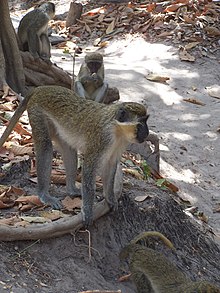
Sept-places or bush taxis run from Dakar to Gambia's border, Karag. From there you must take another Taxi to Barra and then a 30 minutes Ferry to Banjul.
It is possible use your private car to drive from Senegal to The Gambia via the border town of Amdalli (just north of Barra). The border crossing is pretty straightforward. You will need your V5 logbook. The road approaching the border from Senegal is terrible and its easier to drive next to the road as opposed to on it. Check before you travel if it is ok to bring in a right-hand drive vehicle, as there are conflicting reports on the possibility of this (though it has been done).
There are direct GPTC buses running from Barra (a ferry ride away from Banjul) to Dakar, but these are not recommended as they are slower than the bush taxis.
It is possible to charter privately small fishing vessels from Dakar and neighboring areas; though this can be fairly expensive and slow should one not be proficient at bargaining.
- Gambia Transportation Service Company

There are two types of cabs: green ones (tourist cabs) and yellow ones (regular cabs). Green cabs are expensive and the price is regardless of the number of passengers. Although there is no vehicle testing system in The Gambia, these taxis must have basics such as seat belts and working indicators. Yellow taxis are much cheaper and the price depends on the number of persons in the cab. They are used mainly by locals, and in many tourist areas they are prohibited from picking up tourists. Often it is worth it to walk a little to get a yellow taxi.
A 4WD is recommended if you plan to rent a car, since the roads often are in bad condition and only a minority is paved.
You can rent a bike from pretty much anyone that owns one at a negotiated rate. Cycling on major roads can be risky, as motorist safety is unreliable, some roads are not well-maintained, sand and steep shoulders cause road hazards, and pedestrians may walk or veer onto the open road without warning. In high traffic areas, taxis and vans often cut off cyclists to pick up travellers and the car horn may be used excessively to warn of impending passage.
No, don't use your thumb. It is an obscene gesture in The Gambia, instead wave if you want a car to stop. As anywhere, hitching is quite risky business, so be careful with what cars you enter and never hitch at night. Also, Gambian motorists will expect you to pay for the ride, so have some cash ready.
The Gambia River is navigable the entire length of the country.
Guided tours
There are many companies that offer guided tours in The Gambia.
There are also official tourist guides that will arrange transportation and guide you. They offer a good service and you will get to travel in a small group (usually 1 to 6 persons). Beware that there are false official guides, so always meet them at their offices, around tourist resorts.
Languages spoken in The Gambia are English (the official language), Mandinka, Wolof, Fula, Sarrancule and other indigenous languages.
Most of the locals speak Wolof in the major cities, English being widely used at tourist venues.
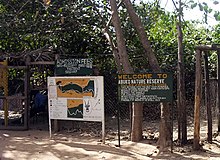
- 13.39 -16.6522 1 Abuko Nature Reserve . open daily 08:00-18.30 . Nature park situated outside the village of Lamin in the Kombo North District, 25 km from Banjul. At 105 hectares it is one of the smallest (if not the smallest) protected areas in Africa, but it still offers a good introduction to the Gambian wildlife. For instance there's monkeys, crocodiles and some 300 species of birds D35 .
- 13.429749 -16.730777 2 Bijilo Forest Park ( at Kololi ). Birds and monkeys. Can bribe the animals with peanuts for better photos. The staff will try to pressure you into paying for a guide guide. D150 . ( updated Nov 2022 )
- 13.641 -14.963 3 Gambia River National Park . Beautiful national park below Janjanbureh. The camp is pricey, but worth the money. They will organize boat tours to see chimpanzees, baboons, monkeys, crocodiles, etc.
- Makasutu Culture Forest , Serekunda ( north of Brikama ). A 1000-ha reserve of mangroves, palm groves and savannahs with baboons, monkeys, birds and monitor lizards. About 45 min from Banjul - a D1300 taxi ride, and the driver will wait for you.
- 13.26235 -16.7895 4 Sanyang Beach . One of the most beautiful beaches in Gambia. Public transport leaves from Serekunda and Brikama regularly, and private taxis can also be hired for day trips.

- 13.476838 -16.674693 5 Kachikally Sacred Crocodile Pool , Bakao ( In Bakau, like 10 or so blocks inland from the Bakau Craft Market ), ☏ +220 7782479 , [email protected] . Opportunity to touch/pet West African Nile Crocodiles. D50 .
- Four Wheel Drive Adventure . Very popular tours visiting schools, country homes, and distilleries.
- "Roots" tour to Kunta Kinteh Island . You can go there on cruise up the centre of the wide Gambia river, towards the former French trading post of Albreda and the village of Juffureh. Views of the river bank are distant. Visit the setting of Roots , an old slave trade station. Tourists are overwhelmed by locals who appear only when the boat arrives, and disappear when the boat leaves. Locals are persistent in begging for money and thrusting craft items under tourists noses. Locals insist on being paid to appear in photos. Or you go by car, e.g. with the official tourist guides on the small roads on the North Bank and sail in a pirogue from Juffareh.
- Christmas . Celebrated mostly by Gambians as a limited holiday. The spirit of Christmas in the Gambia includes holiday seasonal observances at beach resorts and a parade of colourful masquerades.
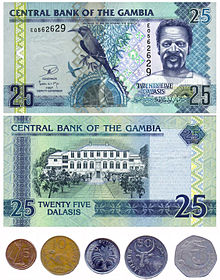
The Gambia uses the dalasi as its currency, denoted by the symbol " D " (ISO currency code: GMD ). The dalasi is divided into 100 bututs . Banknotes come in denominations of 5, 10, 20, 25, 50, 100 and 200 dalasis and you may find D0.25, D0.50 and D1 coins in circulation.
It is better you take CFA francs, euro or dollars with you. If you have a Visa credit card and don't use a PIN or you forgot it, then the only bank that can help you out is (the bigger) GT Bank in Banjul, which only requires your card, your passport, and your signature.
- MasterCard and Visa can now be used at any GT Bank or EcoBank ATMs to withdraw cash.
- Access Bank takes Visa cards only and can be found in Barra, Senegambia Beach and Banjul.
- Kora is the main music instrument of the Mandinka tribe, and could be considered the national instrument of The Gambia. It is 21-stringed and built from a large calabash cut in half and covered with cow skin to make a resonator. It sounds like a mixture of harp and flamenco guitar. Real koras can be very expensive but small souvenir versions are also available.
- Tailor made clothes can be bought at cheap prices.
- wood carvings
- wooden masks
- African drums
- hand-woven table runners and place mats.
- Batik and tie-dye fabric.
- Brikama Market . Big market with some interesting stores, e.g., batik
- Brikama Craft Market ( ca 10 km north of Brikama, i.e., too far to walk from Brikama ). 20-30 small stores with mostly wood carvings. Better selection than the similar stores at tourist attractions and hotels
- Gena Bes Batiks , no 16, Salung St, Bakau ( in Bakau between the old Kachikally Cinema and the Crocodile pool ), ☏ +220 449 5614 . Nice batik designs From D1000 .
- Benachin or Jollof rice — a traditional West African rice dish with onions, spices, tomatoes or tomato paste mixed with meat, fish or vegetables.
- Chicken Yassa — chicken boiled with onion, black pepper and lime or lemon.
- Domoda — meat stew with rice and peanut butter sauce.
- Lots and lots of peanuts , the main crop of The Gambia.
- International food . Please don't be put off by what you may hear about Gambian cuisine, everything may come with rice, but the cuisine is international and the fish is great. But if you're after something your stomach is used to, then there is a plethora of international restaurants to choose from where you can have a Chinese or Indian curry, good old fish & chips or Japanese noodles, and there are also Thai, Lebanese, German, Dutch and Mexican even British-run eateries where you can get a full English breakfast.
- Gambia's own beer, Julbrew [ dead link ] is worth a try. It's made by Banjul Breweries, who also make soft drinks.
- Palm Wine is juice from palm trees that is collected and fermented. It is used as a kind of wine by the locals, and you may get a chance to try it if you go on a tour to rural The Gambia.
- Baobab juice

- Spirits . You can most of the well known spirits and liqueurs in the tourist areas along the coastal strip
- Spirits, Beers & Cigarettes . Julbrew is a lager beer, it is mainly sold in bottles but you can get in a draught form which is a lot less gassey than the bottled. You can get most of the spirits you would expect to find at home and they are still a lot cheaper than in the Costas, Greece or Turkey. Whisky, rum, gin, vodka, brandy are freely available as are Curacao and Tia Maria. Cigarettes can be bought very cheaply at around GBP2.50, €2.80 per 200 pack from all the main supermarkets or in the tourist areas. ( updated Dec 2022 )
There are many luxury 4- and 5-star resorts along the Atlantic coastline. Further in land there are eco camps and lodges which offer basic accommodation usually in natural surroundings.

There are a number of very commonly used scams in The Gambia. If someone stops you on the street, they may tell you that they remember you from the hotel you're staying at and that they work there. They may invite you to another hotel, but this could be a scam to attempt to rob you. Also, because people are constantly looking for ways to support themselves, if they offer you assistance or directions, it may be understood that they expect some monetary compensation.
Sadly, many Gambian military have an unfavorable view of Brits (sometimes white people in general) and can be extremely racist. Expect it especially at border crossings as you will almost always be asked to pay to have your passport stamped and receive more than a few insults aimed at not only your country but also yourself when you refuse to pay. As always, do NOT pay any bribes as you're only making the problem worse, not just for tourists but the locals that are already struggling to fight the rampant corruption. Absolutely do not mention calling an embassy as this will only enrage them and start another string of abuse, as your embassy has no control over them and they hate the thought of it. If you've made friends with a Gambian they might possibly be able to help but as The Gambia is seen as one of the most repressive countries in Africa, they may be putting themselves at risk of punishment - so don't get annoyed if you're not assisted.
Scams also exist in which marijuana is offered to tourists or they are invited to come smoke in a home, only to find police waiting for a hefty bribe. A simple "Sorry, I am in a hurry" could suffice to dismiss them. But don't tell them why you are in a hurry and don't say anything else after that as this may lead to a conversation, and this could lead to unwanted attention and possibly a scam. Also remember that some Bumsters are not unemployed or young, and never fall for hardship stories. Should you feel you want to give a person some money out of sympathy or just to get rid of them it will certainly lead them to ask you for more money at a later date should you meet again. Some recommend a stern and harsh response to such requests, but this should be informed by your values and the relationship formed with the individual in question. Keep in mind that you may see this person again, and they could truly be helpful if you're in a jam or need information. Many people in tourist areas are merely 'friendly facilitators' who may hope for an exchange of favors, but are harmless. Being overly guarded could deny you an offer to join a local family for a traditional meal, or to personally meet one of the craftspeople who make the local goods for sale.
The Gambia is a great holiday destination but just keep your guard up at all times.
When swimming, be aware that the currents in the Atlantic waters can be strong. Always look out for flags on the tourist beaches indicating the level of danger on a red — yellow — green scale.
Be careful about your political opinions, as such critical opinions against the government are considered a crime.
Active homosexuals could be in extreme danger in The Gambia, subject to possible arrest or even killing.
Stay healthy
Yellow fever vaccination is strongly recommended. Meningitis vaccination is recommended. Anti- malaria pills are also necessary. Most cases of malaria in The Gambia are contracted between June and December. Mefloquine, Doxycycline or Malarone are the medicines of choice for The Gambia, and for most of sub-Saharan Africa, because of the increasing chloroquine resistance.
It is a good idea to bring insect repellent , sunscreen and other health items from your home country since these may be hard to find in some areas.
Residents say the tap water is drinkable, but for travelers bottled or boiled water is advised, because you may get sick from the different minerals and microbes in the water.
Always ask before you take a photo of anyone. Some Gambians have certain beliefs about having their picture taken, in particular by a stranger.
- Africell is the major 4G operator in the country and sell points can be found nearly everywhere. They will ask for your passport and will sell you an activated SIM card in minutes. The connection is usually good in Banjul and Senegambia beach area. a 1 Gigabyte data card used to cost 450 dalasis as April 2023.
- Senegal is both north and south of The Gambia. There are excursions to Fathala Reserve just north of the border.
- Has custom banner
- Has mapframe
- Has map markers
- Articles with dead external links
- See listing with no coordinates
- Do listing with no coordinates
- Buy listing with no coordinates
- Eat listing with no coordinates
- Drink listing with no coordinates
- Outline countries
- Outline articles
- Country articles
- West Africa
- All destination articles
- Has Geo parameter
- Pages using the Kartographer extension
Navigation menu
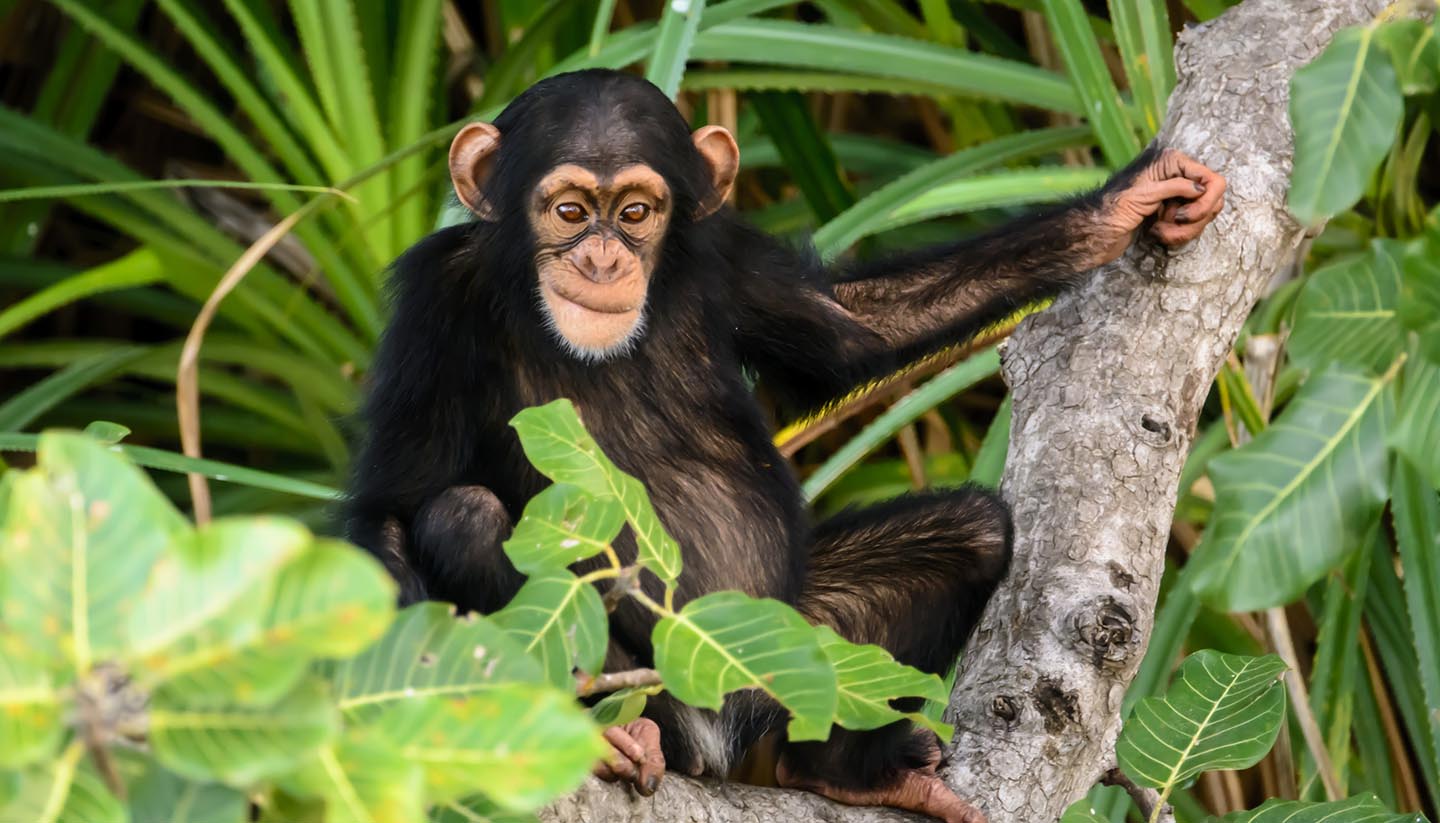
Introducing Gambia
About gambia.
- Images of Gambia
- History, language & culture
- Weather & geography
- Doing business & staying in touch
Plan your trip
- Travel to Gambia
- Where to stay
While you’re there
- Things to see & do
- Shopping & nightlife
- Food & drink
- Getting around
Before you go
- Passport & visa
- Public Holidays
- Money & duty free
Book your flights
- Bakau beaches
- Kololi beaches
Gambia travel guide
The Gambia may be mainland Africa's smallest nation, but it punches way above its weight in terms of attractions. With its glorious long sandy beaches, bustling architecturally-stunning towns and wealth of wildlife, it's perhaps the most striking of all West African countries. What's more, its people are kind and welcoming, giving The Gambia the reputation of being the 'The Smiling Coast'.
Virtually enveloped by its much larger neighbour Senegal, The Gambia's narrow landmass still retains its own clear identity, despite the colonial carve up of Africa. Although this accessible Anglophone country's more obvious draw is perhaps the joy of winter sun at good-value rates, its rich history and fascinating mix of cultures make it hard to pigeonhole. If you escape the sun loungers, you will uncover another side of the country, rich in eco-tourism opportunities, wilderness, wildlife and bird watching.
Inextricably linked to the Gambia River, one of Africa's great waterways, The Gambia comprises a varied landscape, featuring lush tropical forests, swamps, marshes and large areas of wooded savannah. Alongside this are Gambia's parks, reserves and riverbanks including Kiang West National Park and River Gambia National Park, where you’ll see all kinds of wildlife, including monkeys, crocodiles, a small population of hippos and well over 500 bird species.
Of course, one of the main attractions is the coast. There are only 80 kilometres of shoreline, but the beaches are some of the most stunning in the region. Relatively uncrowded and shaded by multitudes of swaying palm trees, you'll be forgiven for thinking you've stumbled on paradise. Tanji and Bakau are both working beaches, featuring arrays of colourful pirogues and little fishing boats, perfect for experiencing traditional activities. For awe-inspiring sunsets, pick a spot on Batokunku Beach and stretch out on the unspoilt sand.
Visitors keen to experience West African music and rural culture may head off the beaten track and up-country to simple, traditional villages. All year round you'll find vibrant festivals, events full of traditional drumming, energetic dancing as well as customary wrestling matches. But for many, it is The Gambia's idyllic cocktail of sunny days, warm welcomes and relaxing Atlantic beach resorts that lures them time and again to this little slice of African heaven.
11,295 sq km (4,361 sq miles).
2,280,102 (World Bank estimate 2018)
202 per sq km.
President Adama Barrow since January 2017.
Travel Advice
Before you travel .
No travel can be guaranteed safe. Read all the advice in this guide. You may also find it helpful to:
- see general advice for women travellers
- read our guide on disability and travel abroad
- see general advice for LGBT+ travellers
- read about safety for solo and independent travel
- see advice on volunteering and adventure travel abroad
Travel insurance
If you choose to travel, research your destinations and get appropriate travel insurance . Insurance should cover your itinerary, planned activities and expenses in an emergency.
About FCDO travel advice
The Foreign, Commonwealth & Development Office ( FCDO ) provides advice about risks of travel to help British nationals make informed decisions. Find out more about FCDO travel advice .
Follow and contact FCDO travel on Twitter , Facebook and Instagram . You can also sign up to get email notifications when this advice is updated.
This information is for people travelling on a full ‘British citizen’ passport from the UK. It is based on the UK government’s understanding of The Gambia’s current rules for the most common types of travel.
The authorities in The Gambia set and enforce entry rules. If you’re not sure how these requirements apply to you, contact the Gambian High Commission in the UK .
COVID-19 rules
There are no COVID-19 testing or vaccination requirements for travellers entering The Gambia.
Passport validity requirements
To enter The Gambia, your passport must be valid for the duration of your stay.
Check with your travel provider that your passport and other travel documents meet requirements. Renew your passport if you need to.
You will be denied entry if you do not have a valid travel document or try to use a passport that has been reported lost or stolen.
Visa requirements
You do not need a visa to visit The Gambia. You’ll get a stamp in your passport that allows you to stay for 28 days when you arrive.
You can get 2 extensions of 28 days from the Immigration Office in Banjul or the tourist police stations in the Tourism Development Area.
You’ll need a residence permit for longer stays. For more information contact the Gambian High Commission in the UK .
Airport tax
You must pay an Airport Security Fee when you arrive in and leave the country. The fee is 20 US dollars, which can also be paid in euros, British pounds, or local currency. Visa credit cards are accepted but card machines are often out of service. You can pay the fee at marked kiosks in Banjul International Airport. Children aged 1 or under and passengers transiting are exempt.
Entry through land borders
If you are driving across the border in a private vehicle you may be asked to pay a vehicle registration fee.
Vaccine requirements
To enter The Gambia, you must have a certificate to prove you’ve had a yellow fever vaccination if you’re coming from a country listed as a transmission risk .
You may need a yellow fever certificate for onward travel to some other countries, due to the risk of yellow fever in The Gambia.
For full details about medical entry requirements and recommended vaccinations, see TravelHealthPro’s The Gambia guide .
Customs rules
There are strict rules about goods you can take into or out of The Gambia . You must declare anything that may be prohibited or subject to tax or duty.
Terrorism
There is a high threat of terrorist attack globally affecting UK interests and British nationals, including from groups and individuals who view the UK and British nationals as targets. Stay aware of your surroundings at all times.
UK Counter Terrorism Policing has information and advice on staying safe abroad and what to do in the event of a terrorist attack. Find out how to reduce your risk from terrorism while abroad .
Terrorism in The Gambia
Although there is no recent history of terrorism in The Gambia, attacks cannot be ruled out.
Attacks could be indiscriminate including in places visited by foreigners. Stay aware of your surroundings, keep up to date with local media reports and follow the advice of local authorities.
Political situation
Avoid large gatherings and protests in public areas and follow the advice of local authorities.
Be cautious of young men locally known as ‘bumsters’ who approach tourists, particularly on beaches, offering help or to act as local guides. They may offer to take you on tours into Senegal. It is unlikely they will follow the correct immigration procedures. This could result in you being detained by immigration authorities. They may also ask for money.
Be polite but firm in refusing unwanted help or attempts at conversation.
Corruption is present at all levels and you may be asked for bribes.
Protecting your belongings
There are reports of passports and other valuables being stolen from hotel rooms.
Petty theft is a problem in cities and tourist areas. Take care when visiting certain places, especially at night, such as:
- isolated beaches
- crowded events
- venues outside the main tourist areas
Do not take valuables or large sums of money to the beach or display them in public. Take sensible precautions to protect your personal possessions and do not leave valuables in unattended vehicles. Keep a copy of your passport’s photo page, and your entry stamp, in a separate place.
Local travel
Security checkpoints operate in and around the capital Banjul and are common on all major routes in The Gambia. They are not always well sign-posted. Take care when approaching them and expect your vehicle to be searched if you’re stopped by security forces.
Laws and cultural differences
The Gambia is an Islamic country. Respect local traditions, customs, laws and religions. Make sure your actions do not cause offence, especially during the holy month of Ramadan or if you intend to visit religious areas. There may be serious penalties for doing something that might not be illegal in the UK but is in The Gambia.
Ramadan is a holy month for Muslims. The dates vary by year and country. During this time, you should be respectful of those who are fasting.
Get more advice when you arrive from your tour guide, hotel or business contacts.
You should also:
- check opening hours of shops and restaurants
- be aware that driving may be erratic, particularly when people are trying to get home at dusk
- be patient and show tolerance
Personal ID
As a foreign national, you must carry ID such as a passport. The police will usually accept a printed copy.
Public offences
There are severe penalties for any form of sexual offence against a child. There are reports of increased child sex tourism. Report any incidents to the police.
Detainment
It is not always possible for the British High Commission to gain early access to detained British nationals in The Gambia.
Although the law specifies that detainees cannot be held for longer than 72 hours without charge, this is regularly exceeded.
The death penalty applies for a number of crimes including arson, murder and treason. A pause on the death penalty is in place.
Illegal drugs and prison sentences
There is a zero tolerance towards illegal drugs. This includes importing, exporting, or possession of drugs. Do not accept packages on behalf of anyone without knowing the contents.
Sentences for those found in possession of drugs can be severe, including fines or prison sentences. Cases of entrapment by Gambian authorities are not uncommon.
LGBT+ travellers
There is a zero tolerance towards LGBT+ people in The Gambia. Same-sex relationships are illegal and could lead to lengthy prison sentences.
Gambian law criminalises the act of men dressing as women with a 5-year jail term.
Read more advice for LGBT+ travellers .
The Gambia is primarily a cash-based economy. Check with your tour operator or hotel before travelling. An increasing number of hotels and restaurants accept Visa cards but very few accept credit cards. There are not many ATMs outside the tourist area of Senegambia. In other locations, ATMs can be unreliable.
Transport risks
Road travel .
If you are planning to drive in The Gambia, see information on driving abroad .
You can use a UK photocard driving licence to drive in The Gambia for up to 3 months. If you still have a paper driving licence, you may need to update it to a photocard licence .
After 3 months you must apply for a Gambian driving licence, you can contact the local police station to ask where the nearest licensing office is. For the application process you need:
- proof of residency in The Gambia
- your valid UK driving licence
- a copy of your passport
Driving conditions
Driving standards are poor, roads are severely potholed and after dark there is poor road and vehicle lighting.
There is heavy rainfall from June to October, which can cause localised flooding. Take care if you’re travelling in rural areas or on non-paved roads during this period.
Some local taxis are not roadworthy.
River travel
The ferry service from Banjul to Barra is operating but it is often overcrowded and overloaded. Safety measures and maintenance are not up to international standards and ferries lack life saving equipment and rescue services. Consider using the alternative route across the Senegambia Bridge near Farafenni.
There have been several instances of the ferry becoming stranded on sandbanks. If using the ferry, get out of your vehicle quickly after parking to avoid becoming trapped inside your vehicle for the duration of the journey.
Pirogues (wooden dug-out canoes) in The Gambia can be overloaded and safety measures are not up to international standards. They are not recommended for long journeys. If you do travel on one, make sure it has life jackets.

Extreme weather and natural disasters
Find out what you can do to prepare for and respond to extreme weather and natural hazards .
Localised flooding can occur during the rainy season, which runs from June to October.
Before you travel check that:
- your destination can provide the healthcare you may need
- you have appropriate travel insurance for local treatment or unexpected medical evacuation
This is particularly important if you have a health condition or are pregnant.
Emergency medical number
There is no equivalent to the UK’s 999 emergency number in The Gambia, it is best to visit in-person to ask for emergency contact details at local stations.
Contact your insurance company quickly if you’re referred to a medical facility for treatment.
Vaccine recommendations and health risks
At least 8 weeks before your trip:
- check the current vaccine recommendations for The Gambia
- see how to get vaccines and whether you have to pay on the NHS travel vaccinations page
See what health risks you’ll face in The Gambia including:
- yellow fever
- malaria and dengue
- schistosomiasis
UNAIDS estimated that around 24,000 adults aged 15 or over in Gambia are living with HIV. The prevalence percentage was estimated at around 1.4% of the adult population compared to the prevalence percentage in adults in the UK of around 0.2%. You should use normal precautions to avoid exposure to HIV/AIDS.
Medication
The legal status and regulation of some medicines prescribed or bought in the UK can be different in other countries.
If you bring prescription medication into The Gambia, take a copy of your prescription and keep items in the original packaging. Some prescription and over-the-counter medicines like those containing codeine or diazepam are banned under The Gambia’s drugs laws. For more information on the legal status of a specific medicine, check with the Gambian High Commission in the UK before you travel.
In The Gambia you will need to go to a pharmacy to get most over-the-counter medicines. Only a very limited selection are available at supermarkets or other stores. Not all medicines available in the UK will be available in The Gambia.
If you require specialist medication, check availability before travel or make arrangements to bring your medication with you. The widely used symbols are a green cross or a green ‘Bowl of Hygieia’ (a chalice or cup with a snake twined around it).
Read best practice when travelling with medicines on TravelHealthPro .
Healthcare in The Gambia
Medical facilities in The Gambia are very limited and the cost of medical evacuation can be very high. Private clinics will only treat fee-paying patients.
FCDO has a list of medical providers in The Gambia where some staff will speak English.
There is also guidance on healthcare if you’re living in The Gambia .
Travel and mental health
Read FCDO guidance on travel and mental health . There is also mental health guidance on TravelHealthPro .
The Foreign, Commonwealth & Development Office ( FCDO ) cannot provide tailored advice for individual trips. Read this travel advice and carry out your own research before deciding whether to travel.
Emergency services in The Gambia
There is no equivalent to the UK’s 999 emergency number in The Gambia. Individual police stations and fire stations have their own numbers (these are often mobile numbers, as many do not have a landline). There are no publications listing these numbers so it is best to visit in-person to ask for emergency contact details at local stations.
Contact your travel provider and insurer
Contact your travel provider and your insurer if you are involved in a serious incident or emergency abroad. They will tell you if they can help and what you need to do.
Refunds and changes to travel
For refunds or changes to travel, contact your travel provider. You may also be able to make a claim through insurance. However, insurers usually require you to talk to your travel provider first.
Find out more about changing or cancelling travel plans , including:
- where to get advice if you are in a dispute with a provider
- how to access previous versions of travel advice to support a claim
Support from FCDO
FCDO has guidance on staying safe and what to do if you need help or support abroad, including:
- finding English-speaking lawyers and funeral directors in The Gambia
- dealing with a death in The Gambia
- being arrested or imprisoned in The Gambia
- getting help if you’re a victim of crime
- what to do if you’re in hospital
- if you’re affected by a crisis , such as a terrorist attack
Contacting FCDO
Follow and contact FCDO travel on Twitter , Facebook and Instagram . You can also sign up to get email notifications when this travel advice is updated.
You can also contact FCDO online .
Help abroad in an emergency
If you’re in The Gambia and you need emergency help from the UK government, contact the British Embassy in Banjul .
FCDO in London
You can call FCDO in London if you need urgent help because something has happened to a friend or relative abroad.
Telephone: 020 7008 5000 (24 hours)
Find out about call charges

Book a Hotel
© Columbus Travel Media Ltd. All rights reserved 2024
2024 U.S. Election September 23, 2024
Returning your absentee ballot from overseas.
- Travel Advisories |
- Contact Us |
- MyTravelGov |
Find U.S. Embassies & Consulates
Travel.state.gov, congressional liaison, special issuance agency, u.s. passports, international travel, intercountry adoption, international parental child abduction, records and authentications, popular links, travel advisories, mytravelgov, stay connected, legal resources, legal information, info for u.s. law enforcement, replace or certify documents.
Before You Go
Learn About Your Destination
While Abroad
Emergencies
Share this page:
Travel Advisory July 31, 2023
The gambia - level 2: exercise increased caution.
Reissued with obsolete COVID-19 page links removed.
Exercise increased caution in The Gambia due to crime and inadequate health infrastructure. Some areas have increased risk. Read the entire travel advisory.
Exercise increased caution due to other factors in
- The southern border area adjacent to Senegal’s Casamance region due to the potential presence of landmines and sporadic border skirmishes.
Country Summary: Theft and home burglaries occur frequently in The Gambia, especially in the broader Banjul area. U.S. government personnel live in housing with heightened security measures.
The Gambia’s health infrastructure is inadequate; services, hygiene, and quality control do not meet U.S. standards of care. Pharmacies are not well regulated; locally available medications may be unsafe.
The Gambia’s Southern Border with Senegal: Some landmines from the Casamance conflict remain in the border region. There have been occasional border skirmishes in this region. If travelling near or across the border stay on main roads and do not travel at night.
Read the country information page for additional information about travel to The Gambia.
If you decide to travel to The Gambia:
- Do not stray from main roads and well-traveled locations if you travel to areas in southern Gambia that border the Casamance region of Senegal.
- Be aware of your surroundings.
- Bring your own over the counter and prescription medications.
- Enroll in the Smart Traveler Enrollment Program ( STEP ) to receive alerts and make it easier to locate you in an emergency.
- Follow the Department of State on Facebook and Twitter .
- Review the Country Security Report for The Gambia.
- Prepare a contingency plan for emergency situations. Review the Traveler’s Checklist .
- Visit the CDC page for the latest Travel Health Information related to your travel.
Embassy Messages
View Alerts and Messages Archive
Quick Facts
Valid for duration of stay.
None required, but see Health section.
Embassies and Consulates
U.S. Embassy Banjul 92 Kairaba Avenue, Fajara Banjul, The Gambia Telephone: +(220) 439-2856 Emergency After-Hours Telephone: +(220) 439-2856 Fax: +(220) 439-2475 Email: [email protected]
Destination Description
Learn about the U.S. relationship to countries around the world.
Entry, Exit and Visa Requirements
The Government of The Gambia requires visitors to obtain a visa prior to or upon entering the country. The fee for a Gambian visa issued through the Gambian Embassy in the United States is currently $200 but is subject to change. Alternatively, tourists can apply for a visa upon arrival in The Gambia. Tourists are typically granted a 30-day stay in The Gambia upon arrival. The fee for this visa on arrival is currently $108 but is subject to change. You must have at least one blank page in your passport for the stamp. Travelers who stay beyond the allowed time are fined $15 per month of overstay, payable in cash at the airport upon departure. Extensions to stays can be requested at the Department of Immigration in Banjul.
Visit the Embassy of The Gambia in Washington DC’s website for the most current visa information. However, please note that the Embassy of The Gambia’s website is frequently not functioning and current information on visas may be difficult to find.
Travelers entering and exiting The Gambia are required to pay a $20 security fee upon arrival and departure at the airport, payable in cash (USD or dalasi) only at kiosks.
The U.S. Department of State is unaware of any HIV/AIDS entry restrictions for visitors to or foreign residents of The Gambia.
Find information on dual nationality , prevention of international child abduction , and customs regulations on our websites.
Safety and Security
Avoid the areas of southern Gambia which border the Casamance region in Senegal , due to potential landmines.
Crime: Petty street crime is common. Beware of pickpocketing, purse/bag-snatching, phone-snatching, and theft from vehicles. These crimes occur on ferries, on the beach, in markets and other commercial areas, and in hotels. Ensure that your travel documents, luggage, and valuable items are secure.
Beware of “bumsters” - local men who approach tourists, particularly on beaches and tourist zones, offering help, to act as local guides or to enter into a relationship. They will often demand payment for their services, even if no agreement has been made. Be polite but firm in turning down unwanted help or attempts at conversation.
Avoid walking alone, including on beaches, in tourist areas, and after dark.
Do not display cash and valuable personal property.
Drive with doors locked and windows closed or rolled up enough at all times to prevent theft while stopped in traffic.
Demonstrations: Demonstrations occur frequently. They may take place in response to political or economic issues, on politically significant holidays, and during international events.
- Even demonstrations intended to be peaceful can turn confrontational and possibly become violent.
- Avoid areas around protests and demonstrations.
- Check local media for updates and traffic advisories.
International Financial Scams : See the Department of State and the FBI pages for information.
Relationship fraud/scams: Internet and in-person friendship, romance and financial scams are prevalent in The Gambia. Scams are often initiated through Internet postings/profiles or by unsolicited emails, letters, WhatApp, texts, and/or contact initiated in person. Scammers sometimes pose as U.S. citizens who have no one else to turn to for help, others ask for assistance to help them and family members in need. They request financial assistance from victims to help pay for potentially fraudulent or potentially partially valid claims, such as for urgent medical treatment, school fees for numerous relatives, rent payments, car repair, payment of exit taxes, or government fines.
Do not send money to anyone you have not met in person and whose situation you cannot independently verify.
If you believe you might be a victim of an internet or similar scam, it is strongly recommended that you send no money nor gifts and completely disengage from all contact with the individual(s).
See Internet Dating and Romance Scams .
Business fraud/scams: The U.S. Embassy receives reports of scams in which U.S. businesses sent payment, but did not receive shipments.
Be suspicious of any unsolicited offers to participate in lucrative business opportunities, especially if they require financial disclosures, money transfers, large up-front investments, or promises of confidentiality.
Carefully scrutinize all proposals before you commit any funds, provide any goods or services, or undertake any travel.
Victims of Crime: U.S. citizen victims of sexual assault are encouraged to contact the U.S. Embassy in addition to Gambian police. Sexual assaults by relatives are often seen by police as family matters outside their jurisdiction and they may not investigate.
Report crimes to the local police at 117 for police assistance or ambulatory services, and 118 for fire and contact the U.S. Embassy at +(220) 439-2856. The Gambian Police Force operates a 24 hour emergency line at (220) 422-4914. Please be advised that emergency responders may lack fuel for vehicles or face other resource challenges.
Remember that local authorities are responsible for investigating and prosecuting the crime.
See our webpage on help for U.S. victims of crime overseas .
- Provide information regarding options for local medical care; The Gambia has an austere medical environment.
- Assist you in reporting a crime to the police
- Contact relatives or friends with your written consent
- Provide general information regarding the victim’s role during the local investigation and following its conclusion
- Provide a list of local attorneys
- Provide our information on victim’s compensation programs in the U.S.
- Provide an emergency loan for repatriation to the United States and/or a loan for limited medical support in cases of destitution
- Help you find accommodation and arrange flights home
- Replace a stolen or lost passport
Domestic Violence: U.S. citizen victims of domestic violence are encouraged to contact the Embassy for assistance.
Tourism: Outside of primary tourist areas in the immediate capital region, formal tourism industry infrastructure is minimal or nonexistent. The tourism industry is unevenly regulated, and safety inspections for equipment and facilities do not commonly occur. Hazardous areas/activities are not always identified with appropriate signage, and staff may not be trained or certified either by the host government or by recognized authorities in the field. Tourists are considered to be participating in activities at their own risk. Emergency response and subsequent appropriate medical treatment is moderate to minimal in the immediate capital region, and limited to unavailable in much of the rest of the country. First responders are generally unable to access areas outside of major cities and to provide urgent medical treatment. U.S. citizens are encouraged to purchase private medical evacuation insurance .
Local Laws & Special Circumstances
Criminal Penalties: You are subject to local laws. If you violate local laws, even unknowingly, you may be expelled, arrested, or imprisoned. Individuals establishing a business or practicing a profession that requires additional permits or licensing should seek information from the competent local authorities, prior to practicing or operating a business.
Convictions for possessing, using, or trafficking in illegal drugs can result in long prison sentences. This includes use or possession of marijuana.
Furthermore, some laws are also prosecutable in the United States, regardless of local law. For examples, see our website on crimes against minors abroad and the Department of Justice website.
Arrest Notification: If you are arrested or detained, ask police or prison officials to notify the U.S. Embassy immediately. See our webpage for further information.
Dual Nationals: In addition to being subject to all of The Gambia’s laws affecting foreigners, dual U.S. - Gambian citizens may be subject to additional provisions of Gambian law. Please inquire at a Gambian embassy or consulate regarding your status before you travel. Gambian police routinely do not recognize dual citizenship and may treat you solely as a Gambian citizen. This is particularly true if you use a Gambian passport rather than a U.S. passport to enter The Gambia.
Medications: Many common medications are available in Gambian pharmacies although you may need to know the European name or brand to find an equivalent product. Medication, such as insulin, requiring refrigeration may be difficult to store as The Gambia is subject to frequent power outages. You can face fines up to $2,000 and/or three years imprisonment if you arrive with substances containing one percent or more of: hydroquinone (in any form), hydrocortisone (unless in trace amounts and for specific purposes such as anti-itch products), betamethasone, flucinonide, clobestatol, or clobestatone. For more information, including additional restrictions on importing medications, please contact the nearest Gambian embassy or consulate.
Photography: It is against the law to photograph or film airport security operations, military installations, embassies, or government motorcades. You could be fined, have your photographic equipment confiscated without notice, and risk detention and arrest. Do not take photos of Gambians without their permission.
Currency: The dalasi is the official currency, though U.S. dollars, euros, and West African Francs (CFA) are accepted in some places. The Gambia is a cash economy; credit cards are accepted only at major hotels when the internet connection is working and a few restaurants. You should only exchange currency at banks or exchange bureaus. Changing money unofficially is prohibited. Due to the potential for fraud, avoid using ATMs except those at banks. Money transfers are widely available at Western Union branch offices.
Faith-Based Travelers: See the following webpages for details:
- Faith-Based Travel Information
- International Religious Freedom Report – see country reports
- Human Rights Report – see country reports
- Hajj Fact Sheet for Travelers
- Best Practices for Volunteering Abroad
LGBTI Travelers: Under Gambian law, consensual same-sex sexual relations are illegal. Prison terms range from five years to life imprisonment. Antidiscrimination laws do not protect LGBTI individuals, and there is strong societal discrimination against LGBTI individuals. Gambian authorities have called on landlords and owners of bars, restaurants, and hotels to monitor activities that happen in their environments.
See our LGBTI Travel Information page and section 6 of our Human Rights report for further details.
Travelers with Disabilities: The law in The Gambia prohibits discrimination against persons with physical and mental disabilities, though the law not generally enforced. Social acceptance of persons with disabilities in public is not as prevalent as in the United States. Expect accessibility to be limited in public transportation, lodging, communication/information, and general infrastructure. Limited accessibility exists in both the capital city area and the surrounding regions.
- The availability of rental, repair, or replacement parts for aids, equipment, and devices is very limited, if not impossible to find. Service providers, such as sign language interpreters or personal assistants, are not readily available.
Students: See our Students Abroad page and FBI travel tips .
Women Travelers: Although gender-based violence is illegal, many women experience domestic violence. Rape, including spousal, familial, and relationship rape, is a widespread problem. Police generally consider spousal and familial rape to be a domestic issue outside their jurisdiction.
Female genital mutilation/cutting (FGM/C) is a crime. Accomplices who are aware of the practice but do not report it to the police can also be punished. Seventy five percent of girls and women have undergone FGM/C, with fifty six percent of girls undergoing this before the age of 15. Seven of the nine major ethnic groups practice FGM/C on girls from shortly after birth until age 16.
See our travel tips for Women Travelers .
For emergency services in The Gambia, dial 117 .
Ambulance services are unreliable in most areas, including in the immediate capital region.
We do not pay medical bills. Be aware that U.S. Medicare/Medicaid does not apply overseas. Most hospitals and doctors overseas do not accept U.S. health insurance.
Medical Insurance: Make sure your health insurance plan provides coverage overseas. Most care providers overseas only accept cash payments and individuals must then seek reimbursement. See our webpage for more information on insurance overseas. Visit the U.S. Centers for Disease Control and Prevention for more information on type of insurance you should consider before you travel overseas.
We strongly recommend supplemental insurance to cover medical evacuation.
Always carry your prescription medication in original packaging, along with your doctor’s prescription. Check with the government of The Gambia, via the nearest embassy or consulate, to ensure the medication is legal.
Vaccinations: Be up-to-date on all vaccinations recommended by the U.S. Centers for Disease Control and Prevention.
The government of the Gambia does not require vaccines for citizens of the United States unless they are arriving in the Gambia from a yellow fever zone. Visit the U.S Centers for Disease Control’s website to review their recommendations for vaccinations for travelers to the Gambia.
Further health information:
- World Health Organization
- U.S. Centers for Disease Control and Prevention (CDC)
Air Quality: Visit AirNow Department of State for information on air quality at U.S. Embassies and Consulates.
The U.S. Embassy maintains a list of doctors and hospitals . We do not endorse or recommend any specific medical provider or clinic.
Health facilities in general:
- Medical facilities are very limited, some treatments are unavailable, and emergency services can be unpredictable and unreliable. Sanitation may not be at the same level as in the United States
- There are no trauma centers in The Gambia and severe accidents require evacuation to Senegal, Europe or the United States.
General Health:
The following diseases are prevalent:
- Yellow Fever
- Dengue Fever
- Diarrheal Illness
- Meningococcal Meningitis
- Tuberculosis
- Schistosomiasis
Use the U.S. Centers for Disease Control and Prevention recommended mosquito repellents and sleep under insecticide-impregnated mosquito nets. Chemoprophylaxis is recommended for all travelers even for short stays.
Visit the U.S. Centers for Disease Control and Prevention website for more information about Resources for Travelers regarding specific issues in The Gambia.
Water Quality:
- Tap water is not potable. Bottled water and beverages are generally safe, although you should be aware that many restaurants and hotels serve tap water unless bottled water is specifically requested. Be aware that ice for drinks may be made using tap water.
Air Quality:
- Infants, children, and teens
- People over 65 years of age
- People with lung disease such as asthma and chronic obstructive pulmonary disease (COPD), which includes chronic bronchitis and emphysema;
- People with heart disease or diabetes
- People who work or are active outdoors
Travel and Transportation
Road Conditions and Safety: Road conditions are poor, particularly during the rainy season, which generally lasts from July through September. Although main roads are paved in the greater Banjul area, many are potholed and poorly lit. Some drivers in the Banjul area do not use vehicle lights at night, while others habitually drive with high beams on. Side roads in the Banjul area and most roads outside the Banjul area are unlit and unpaved. Livestock and pedestrians pose road hazards throughout the country, including in the greater Banjul area.
Traffic Laws: Numerous accidents are caused by intoxicated drivers. You may be substantially fined or imprisoned if you cause an accident while intoxicated.
The police do not consistently apply traffic laws and regulations, and sometimes compel drivers to pay fines on the spot for violations, real or contrived. Written citations/tickets are rarely given.
Police periodically set up impromptu traffic stops on major streets to check for drivers’ licenses and proper insurance. You are obligated to stop at all roadblocks or road checkpoints. Do not reverse direction to avoid a road checkpoint or make any movements that security personnel may view as suspicious or provocative.
Government convoys pose serious risks to drivers and pedestrians. Government convoys frequently travel at high speeds and often in either or both lanes of traffic, including in the oncoming traffic lane and do not always use sirens to announce their presence.
- Pull to the side of the road as far as possible.
- Do not attempt to move until the entire convoy has passed.
- Failure to comply may result in vehicle damage and/or personal injury.
Public Transportation: Exercise caution when using taxis, particularly at night. Most taxis lack safety belts and many are not road-worthy.
Water transportation, including government ferries, is unsafe and unreliable. Ferries, which usually lack sufficient numbers of life preservers for all passengers, are often overcrowded. It is highly recommended that you exit your vehicle quickly after parking to avoid becoming trapped inside for the duration of the crossing. However, this is not always possible, increasing the safety risk. The wooden dugout “pirogues” that also cross the Gambia River often leave shore overloaded.
See our Road Safety page for more information. Visit the website of The Gambia’s national tourist office and national authority responsible for road safety.
Aviation Safety Oversight: As there is no direct commercial air service to the United States by carriers registered in The Gambia, the U.S. Federal Aviation Administration (FAA) has not assessed the government of The Gambia’s Civil Aviation Authority for compliance with International Civil Aviation Organization (ICAO) aviation safety standards. Further information may be found on the FAA’s safety assessment page .
Maritime Travel: Mariners planning travel to The Gambia should also check for U.S. maritime advisories and alerts . Information may also be posted to the U.S. Coast Guard homeport website , and the NGA broadcast warnings .
Port Security: The Commandant of the Coast Guard has determined that effective anti-terrorism measures are not in place in The Gambia ports and has imposed conditions of entry on vessels that arrive in U.S. ports having visited ports in The Gambia. Mariners and passengers on commercial vessels traveling through the ports of The Gambia should exercise increased caution.
For additional travel information
- Enroll in the Smart Traveler Enrollment Program (STEP) to receive security messages and make it easier to locate you in an emergency.
- Call us in Washington, D.C. at 1-888-407-4747 (toll-free in the United States and Canada) or 1-202-501-4444 (from all other countries) from 8:00 a.m. to 8:00 p.m., Eastern Standard Time, Monday through Friday (except U.S. federal holidays).
- See the State Department’s travel website for the Worldwide Caution and Travel Advisories .
- Follow us on X (formerly known as "Twitter") and Facebook .
- See traveling safely abroad for useful travel tips.
Review information about International Parental Child Abduction in The Gambia . For additional IPCA-related information, please see the International Child Abduction Prevention and Return Act (ICAPRA) report.
Travel Advisory Levels
Assistance for u.s. citizens, the gambia map, learn about your destination, enroll in step.

Subscribe to get up-to-date safety and security information and help us reach you in an emergency abroad.
Recommended Web Browsers: Microsoft Edge or Google Chrome.
Make two copies of all of your travel documents in case of emergency, and leave one with a trusted friend or relative.
Afghanistan
Antigua and Barbuda
Bonaire, Sint Eustatius, and Saba
Bosnia and Herzegovina
British Virgin Islands
Burkina Faso
Burma (Myanmar)
Cayman Islands
Central African Republic
Cote d Ivoire
Czech Republic
Democratic Republic of the Congo
Dominican Republic
El Salvador
Equatorial Guinea
Eswatini (Swaziland)
Falkland Islands
France (includes Monaco)
French Guiana
French Polynesia
French West Indies
Guadeloupe, Martinique, Saint Martin, and Saint Barthélemy (French West Indies)
Guinea-Bissau
Isle of Man
Israel, The West Bank and Gaza
Liechtenstein
Marshall Islands
Netherlands
New Caledonia
New Zealand
North Korea (Democratic People's Republic of Korea)
Papua New Guinea
Philippines
Republic of North Macedonia
Republic of the Congo
Saint Kitts and Nevis
Saint Lucia
Saint Vincent and the Grenadines
Sao Tome and Principe
Saudi Arabia
Sierra Leone
Sint Maarten
Solomon Islands
South Africa
South Korea
South Sudan
Switzerland
The Bahamas
Timor-Leste
Trinidad and Tobago
Turkmenistan
Turks and Caicos Islands
United Arab Emirates
United Kingdom
Vatican City (Holy See)
External Link
You are about to leave travel.state.gov for an external website that is not maintained by the U.S. Department of State.
Links to external websites are provided as a convenience and should not be construed as an endorsement by the U.S. Department of State of the views or products contained therein. If you wish to remain on travel.state.gov, click the "cancel" message.
You are about to visit:

Exploring the Gems of GAMBIA: A Comprehensive Gambia Travel Guide

Welcome to the vibrant world of Gambia, where stunning landscapes, rich cultural heritage, and warm hospitality await. In this comprehensive Gambia travel guide, we’ve curated essential information, money-saving tips, and a list of must-see attractions to ensure your journey through Gambia is nothing short of extraordinary.
Fast Facts About Gambia
- Climate: Get ready to bask in Gambia’s tropical climate! The sun is a regular visitor, with temperatures ranging from 25°C to 35°C (77°F to 95°F) throughout the year. Rainy season arrives from June to October, so an umbrella might come in handy.
- Local Currency: Gambian Dalasi (GMD) is your go-to currency. ATMs are scattered around, but it’s wise to carry some cash for off-the-beaten-path adventures.
- Power Voltage: Charging your devices is a breeze with 230V power voltage. Keep an adapter with the G-type plug handy to keep your gadgets juiced up.
- Language: You’ll find English to be your travel buddy. It’s widely spoken and understood, making interactions smoother than a calm river ride.
- Religion: Discover Gambia’s religious diversity, with Islam being the dominant faith. Respect for local customs is essential, so when visiting mosques or communities, a modest dress code is appreciated.
- Safety: Gambia is as warm in safety as it is in weather. Crime rates are relatively low, but like anywhere, be cautious with your belongings and stick to well-traveled paths, especially at night.
- Cultural Etiquette: Embrace the Gambian culture by greeting locals with a smile and a courteous “Salaam aleikum” (peace be upon you). A handshake or nod is usually well-received.
- Tipping: A little generosity goes a long way. Tipping around 10-15% in restaurants and to guides shows your appreciation for the excellent service.
Best Time to Visit Gambia: Seasons and Festivals
- Dry Season: November to mid-June is prime time for sun-soaked escapades. The climate is inviting, making it perfect for beach lazing and wildlife watching in national parks.
- Rainy Season: June to October brings a refreshing sprinkle to the country. While some attractions might close temporarily, this is the best time for birdwatching and lush green landscapes.
- Festivals: Gambia’s cultural tapestry comes alive with festivals. Mark your calendar for the Banjul Demba Cultural Festival in April, showcasing traditional music and dance. The Roots Festival in May celebrates the heritage of African Americans with vibrant ceremonies.
- Gambian New Year: A unique experience awaits you on the 18th of February. Celebrate the Gambia’s independence with parades, cultural displays, and infectious energy.
- Kankurang Festival: Held in June, this event features masked dancers, music, and storytelling. It’s a captivating glimpse into Gambian folklore.
Top Attractions and Things to See and Do in Gambia
- Kachikally Crocodile Pool: Get up close with these fascinating creatures at the sacred Kachikally Crocodile Pool . Don’t worry, the crocs here are said to be gentle, and local guides will share intriguing stories.
- Abuko Nature Reserve: Embrace your inner explorer as you navigate through lush forests and diverse wildlife at the Abuko Nature Reserve . Keep your camera ready for sightings of monkeys, colorful birds, and tranquil lagoons.
- Tanji Fish Market: Dive into the heart of Gambian culture at the bustling Tanji Fish Market. Witness local fishermen hauling in their catch of the day and experience the vibrant energy of daily life.
- Janjangbureh: Immerse yourself in history at Janjangbureh (formerly known as Georgetown). This island town is a treasure trove of colonial architecture and echoes of Gambia’s past as a key trade hub.
- Bijilo Forest Park: For a serene escape, head to Bijilo Forest Park. Walk along shaded trails, catch a glimpse of monkeys swinging through the trees, and enjoy panoramic views from the top.
- Craft Markets: Indulge your shopping desires at the bustling craft markets in Serrekunda. Here, you’ll find handmade crafts, intricate textiles, and colorful souvenirs to remember your journey by.
The Best Ways To Get Around Gambia
- Taxis: Taxis are a convenient way to navigate within cities. Make sure to negotiate the fare before you start your ride, and don’t hesitate to haggle a bit.
- Shared Taxis: Shared taxis are a budget-friendly option. They follow fixed routes and usually wait until they’re full before departing.
- Bicycles: Feel the wind in your hair as you pedal your way through scenic routes. Renting a bicycle is not only eco-friendly but also lets you explore at your own pace.
- Local Buses: Hop on a local bus for an authentic Gambian experience. While they might not be the most luxurious, they offer a chance to interact with locals and immerse yourself in daily life.
- River Transport: Take advantage of Gambia’s river network. Ferries and boats offer a unique perspective of the country and can be a relaxing way to travel between destinations.
Accommodation Tips: Gambia
- Beachfront Retreats: From luxury resorts to cozy guesthouses, Gambia’s coastline boasts a range of accommodations. Whether you’re a sun seeker or a water sports enthusiast, staying by the beach offers easy access to the ocean’s delights.
- Rural Getaways: For a tranquil escape, consider lodging in the countryside. Rustic lodges and eco-friendly stays provide a chance to immerse yourself in Gambia’s natural beauty.
- Urban Comfort: In cities like Banjul and Serrekunda, you’ll find a mix of hotels to suit your preferences. Choose from modern establishments with all the amenities or budget-friendly options that leave more room in your wallet for exploring.
Gambia Travel Guide: Money-Saving Tips
- Free Museum Days: Immerse yourself in Gambian culture without spending a dime. The Gambia National Museum in Banjul offers free entry on Saturdays. Delve into the country’s history, art, and artifacts.
- Local Eateries: Savor authentic Gambian flavors at local eateries and street stalls. Try domoda (peanut stew), benachin (one-pot rice), and yassa (marinated meat with onions and citrus).
- Market Shopping: Visit markets like Albert Market in Banjul for vibrant local goods. Bargaining is common, so sharpen your haggling skills and snag unique souvenirs at great prices.
- Public Transport: Opt for shared taxis and local buses to save on transportation costs. They might not be the most luxurious, but they’re an adventure on their own.
- Group Tours: Joining group tours can help cut down expenses while maximizing your experience. Explore river cruises, nature walks, and city tours with like-minded travelers.
Culinary Delights and Traditional Cuisine in Gambia
- Domoda: Dive into a bowl of this peanut stew, bursting with flavors of meat or fish, vegetables, and the heartiness of groundnuts.
- Benachin: Satisfy your taste buds with benachin, Gambia’s version of jollof rice, cooked with a medley of vegetables and your choice of protein.
- Yassa: Indulge in marinated chicken or fish, simmered with tangy onions, mustard, and a dash of citrusy zest.
- Chura Gerte: Satisfy your sweet tooth with chura gerte, a delightful dessert made from groundnuts, sesame seeds, and sugar.
Souvenir Ideas: Bringing a Piece of Gambia Home
- Crafted Textiles: Wrap yourself in the vibrant colors of Gambia with locally woven textiles and fabrics, perfect for clothing or home decor.
- Wooden Carvings: Admire the intricate craftsmanship of wooden masks, figurines, and utensils that showcase Gambia’s rich artistic heritage.
- Beaded Jewelry: Embrace Gambian style with intricately beaded jewelry, from necklaces to bracelets, each piece telling a story of tradition and creativity.
- Local Art: Support local artists by bringing home paintings and sculptures that capture the essence of Gambia’s landscapes, people, and culture.
- Traditional Instruments: Bring the rhythm of Gambia home with traditional instruments like the kora or balafon, allowing you to recreate the country’s soulful melodies.
Additionally, check out our articles about 2023 top travel destinations in the world , and the best holiday destinations in 2024 .
Similar Posts

ZIMBABWE Travel Guide for 2024: Discover the Inspiration

MAURITANIA Unveiled: Your Ultimate Mauritania Travel Guide

Discovering NAMIBIA: Your Comprehensive Namibia Travel Guide

ALGERIA Travel Guide for 2024: Discover Charms of the Desert

Exploring the Hidden Gems: A Comprehensive NIGER Travel Guide

Unveiling the Mystique of LIBYA: A Comprehensive Libya Travel Guide
You are using a very outdated browser. Please upgrade your browser or activate Google Chrome Frame to improve your experience. Alternatively, to make an enquiry, please call our Reservations Team on 01489 866999 . Close this message .

GAMBIA GUIDE

What's the weather like?
It's fair to say that The Gambia enjoys an idyllic climate with temperatures regularly in the low 30s, virtually no rainfall from November to June and a cooling sea breeze.

How much do things cost?
Generally speaking, you'll find your money goes a long way in The Gambia with everyday items like meals, drinks and snacks being very reasonably priced.

How do I get around?
Despite having a fairly rudimentary, if steadily improving, road system and little in the way of public transport, The Gambia is a very easy country to navigate.

In the evenings you might wish to stay in your hotel and enjoy evening entertainment or you could try venturing out to explore the myriad of restaurants and bars.

Food & Restaurants
One of the reasons customers return to The Gambia time and time again is the quality and diversity of the cuisine. You'll certainly not struggle to find new places to eat - and we offer exclusive discount vouchers!

Resort Areas
Kololi and Kotu are the two busiest resort areas in The Gambia - and where a good portion of the hotels we offer are situated - but there are other places to explore.

Shopping in The Gambia
You'll have fun shopping in The Gambia where bargaining and haggling is very much the name of the game - for everything from fruit, to shoes to souvenirs!

Culture, Language & Religion
The Gambia has a fascinating marriage of culture, language, religion and tradition, evident in all aspects of everyday life and in the festivals that take place each year.

Festivals & Music
Music is a part of everyday life in The Gambia and there are a number of festivals that take place each year, most of these are based around annual Islamic festivals.

The banks of the River Gambia have been inhabited for many centuries, but the archaeological evidence is as yet insufficient to throw much light on early Gambia history.

The Gambia Experience with the assistance of our generous customers has long been a supporter of the burgeoning Gambian education system.

Despite the growth of tourism, the economy of The Gambia is still predominantly agricultural, with the majority of Gambians earning their living from the land and sea.

Further areas to explore
There are many resort areas to explore, however, there are few places well off the beaten track that you may wish to explore too.
Fab holiday, all that we wanted. Can’t wait until next year. Makes one appreciate what one has at home.
Mr Davidson – Guest – Palma Rima


FREQUENTLY Asked Question
Have any question look here now.
The tourism regulatory body and responsible for marketing and promotion of The Gambia as a tourism destination
The Gambia Tourism Board is the institution mandated by Government to promote The Gambia as a Tourism Destination
It caters for all tourists (nature lovers, Bird watching, Trekking, leisure and Exotic, water sports and fishing enthusiast) etc
- Tourism Regulations
- Gambia Tourism Board Act
Visit the www.gambiahotels.gm to get the relevant information
The whole country is full of interest sites
The Gambia is one of the safest countries in Africa where tourists can move freely.
+220 4462496 /9/1
The country enjoys virtually uninterrupted sunshine and high daytime temperatures with almost no rainfall from November to June.
Most Europeans do not require a visa to visit. Check your nearest embassy or consulate.
Those needing Visas would be issued upon arrival and normally for 28 days.
Check with your Physician and health service requirements
It is very safe to travel around
There are many banks and currency exchange bureaus. You can also change money at your hotel. ATM services are also available in many tourist locations
Master and Visa cards are accepted in many major shops and restaurants. Please enquire before you buy.
There are safe times to swim. Always check the beach flagging signs. Do not swim when the red flag is up
There are no sharks or predators near the beach
There are Embassies or consulates for most European countries.
You can use a tourist taxi from the hotel to any destination. Other forms of transport are available
Highly revealing and indecent clothing is not permited .
The Gambia offers child friendly accommodations and services in a safe and secure manner.
There are public and private hospitals and clinics easily accessible. One can also buy over the counter and prescribed medicines at various pharmacies.
The Gambia enjoys the services of Four GSM providers. All hotels and major restaurants have free Wi-Fi access.
There is a very low crime rate in the destination.
The Gambia is on GMT and maximum time variance with European countries is 2 hours
It is safe to bring limited number of personal devices freely.
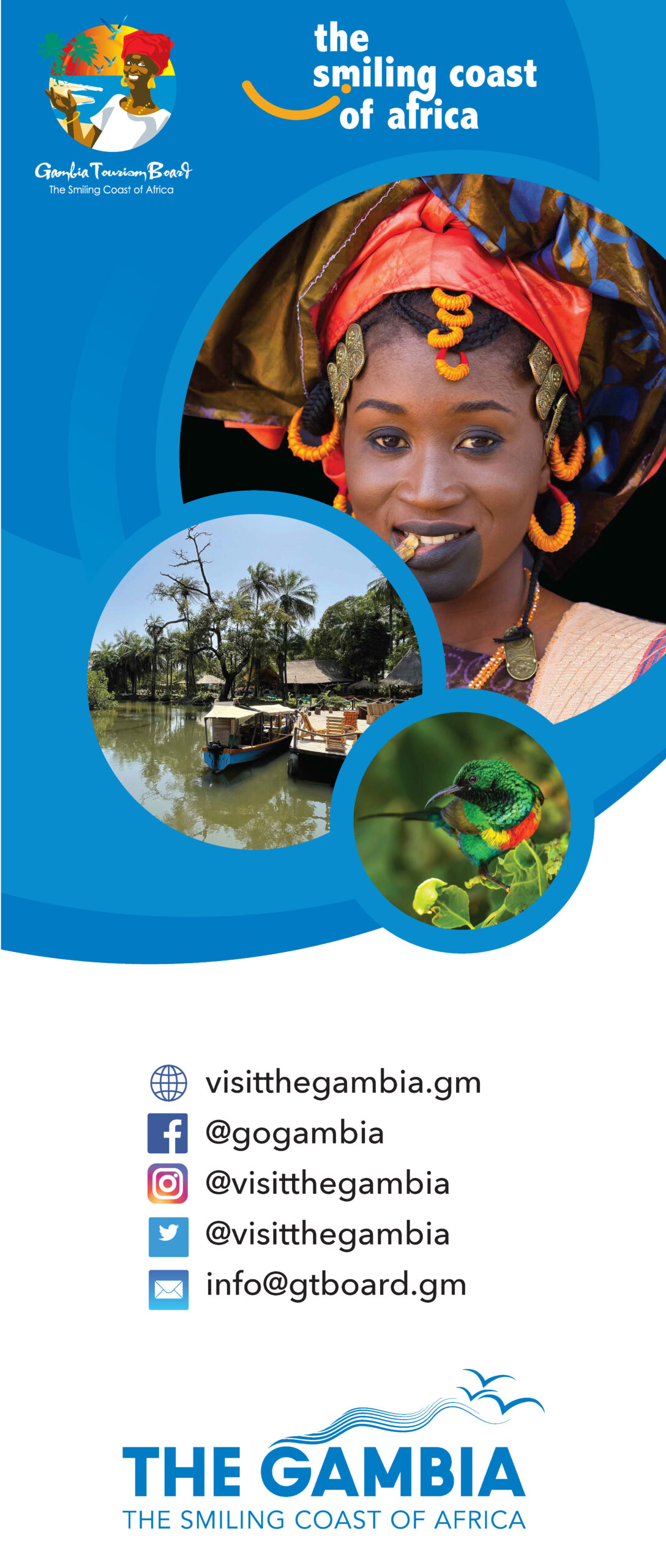
If you have any unanswered questions after reviewing this page, please don’t hesitate to reach out to us via email. We are committed to providing you with the information you need, and our dedicated team will promptly respond to your inquiries. Your satisfaction is our top priority, and we look forward to assisting you further through email communication.
Trending Destinations
Trending articles.

10 of the UK’s best stargazing escapes

10 of the best new wildlife trips for 2024

Where is Dune: Part Two filmed?
Destinations.
Sorry but no search results were found, please try again.
Your full Wanderlust guide to

It’s no wonder that The Gambia is so popular with winter holidaymakers. Friendly, tropical and peaceful, The Gambia is a short flight from Northern Europe and its costal resorts around Banjul are perfect for a lazy poolside break.
More intrepid travellers can head inland to find more classic West African landscapes. Cruise along the River Gambia to spot playful chimpanzees or basking hippos and trace the history of the slave trade at James Island.
Birders will be in seventh heaven at the Bao Bolon Wetland Reserve, a protected area of salt flats, marshland and wetland that is home to a huge number of species.
You can’t miss
Stella marsden’s chimpanzee reserve, gambia.

Wanderlust recommends
- Stay at a bush lodge on the edge of the Makasutu Culture Forest
- Say hello to the chimps at the Chimpanzee Reserve
- Enjoy a Robinson Crusoe moment at Jinack Island – an unspoilt beach cut off from the mainland
- Munch on local produce at a lumo (country market)
- Get your money’s worth out of those binoculars at the Abuko Nature Reserve – home to wild birds, reptiles and monkeys
Latest Gambia articles

Meet Malick Suso, The Gambia’s award-winning birdwatching guide

The Gambia: Why travelling to this West African nation is far easier than you think

Gambia’s mysterious stone circles

How to avoid Gambian bumsters

Taking a gamble in Gambia

How President Obama secured my Gambian Visa

Chimpanzee sanctuary in The Gambia

Daytime temperatures average around 30°C year round. The dry season is mid-October to early June; this is also the main tourist season.
Manatees are found in the River Gambia National Park between February and June. They are frequently heard and sometimes seen. The best time for birdwatching is early in the dry season and early in the rainy season, when migrants arrive.
International airports
Banjul (BJL), 24km from the city.
Getting around
The Gambia has no trains and no internal flights. Most local people get around using the bush taxi, which can be a converted minibus, estate car, van or even cart in rural areas.
Hiring a Land Rover or bike is a fine way of getting around in your own sweet time and allows you to get off the beaten track.
Accommodation
Most travellers to The Gambia will have pre-arranged hotels booked as part of a package. However, it is possible to travel independently, providing you stay away from the resort hotels used by the tour operators.
There are a growing number of riverside ecolodges up country. At the budget end, there are a few tourist guesthouses and homestays. You’ll also find a YMCA hostel in Kanifing, near Serrekunda and an official campsite in Sukuta.
Food & drink
Tourist restaurants tend to be mediocre. For a more authentic experience, head to ‘chop shops’, street stalls or beach bars for some good honest grub. Look for anywhere busy with locals.
Gambian dishes to try include chicken yassa (chicken marinated with onion, lime, garlic and chilli), M’bahal rice (rice mixed with dried fish, groundnuts and peppers) and pate made from bonga , a local bony fish. Gambians also love afra – a local street-style version of the barbecue where you pick the raw meat and watch it be seasoned and sizzled over a hot grill while you wait.
Strict vegetarians will suffer as often even the rice is cooked in meat stock.
Health & safety
Malaria is prevalent; take prophylaxis, especially if visiting in the summer. Get medical advice on inoculations. You may need a yellow fever certificate – check before you go. Don’t drink the tap water.
Related guides

Sign up to our newsletter for free with the Wanderlust Club, full of travel inspiration, quizzes, events and more

- ALL TRAVEL GUIDES
- DESTINATION FILTER
TOP OF PAGE
Quick Facts
Best Time To Go
Cost & Spending
Travel Tips
Regions & Highlights
What To See & Do
Itineraries
What To Eat
Where To Stay
Trip Planning

Welcome traveler!
We're Andre & Lisa, adventurers and experienced budget travelers.
We have over two decades of travel experience and since 2018 have led a full-time nomadic lifestyle.
L earn more about us !
Thank you for visiting and we hope you find value in our destination pages! We thoroughly research and curate all content ourselves and everything you find on this site is put together by only the two of us.

GAMBIA TRAVEL GUIDE
Welcome to The Gambia, a small West African country that is often referred to as the "Smiling Coast of Africa" due to the warmth and friendliness of its people. The Gambia is a popular destination for tourists seeking sun, sea, and sand, as well as a unique cultural experience.
The country is known for its stunning beaches along the Atlantic coast, with popular spots such as Kololi Beach and Sanyang Beach. The Gambia also has a rich history and culture, with traditional music, dance, and art that reflect its diverse ethnic groups.
Visitors can explore the bustling capital city of Banjul, which is located on an island at the mouth of the Gambia River. The city is home to historic sites such as the Arch 22, National Museum, and the bustling Albert Market. Visitors can also take a boat trip up the Gambia River to experience the country's wildlife, including monkeys, hippos, and crocodiles.
The Gambia is also a popular destination for birdwatching, with over 500 species of birds found in the country. The Abuko Nature Reserve is a great spot to see a variety of bird species, as well as monkeys and other wildlife.
With its warm weather, friendly people, and unique cultural experiences, The Gambia is a great destination for tourists looking to explore a different side of Africa.
DO YOU NEED A VISA FOR GAMBIA?
<<VISA RESULT>>
<< Visa Details >>
For the latest requirements or for application click
Let iVisa take the pain out of travel planning and assist you with Electronic visas, Travel Authorizations, Visas on Arrival, and even Paper Visas. They can also help with Health Declarations and Embassy Registrations. If you're from the US, they provide a One-Stop Shop to renew your Passport securely and error-free.
⬇️ REGIONAL GUIDES ⬇️
Travel guide.

⬇️ COUNTRY GUIDE ⬇️
- Capital: Banjul
- Currency: Dalasi (GMD)
- Area: 11,300km²
- Population: 2,28 million (2018)
- Language: English (official), Mandinka, Wolof, Fula, other indigenous vernaculars
- Religion: Muslim 90%, Christian 9%, indigenous beliefs 1%
- Electricity: 230V/50Hz (UK plug)
- 18 February, Independence Day
- 1 May, May Day
- 25 May, African Liberation Day
- 22 July, Revolution Day
- 15 August, Assumption
Also, Good Friday, Easter Monday, Ashura, Maulid an-Nabi, Laylat al-Qadr, Eid al-Fitr, and Eid al-Adha.
QUICK BOOKING RESOURCES
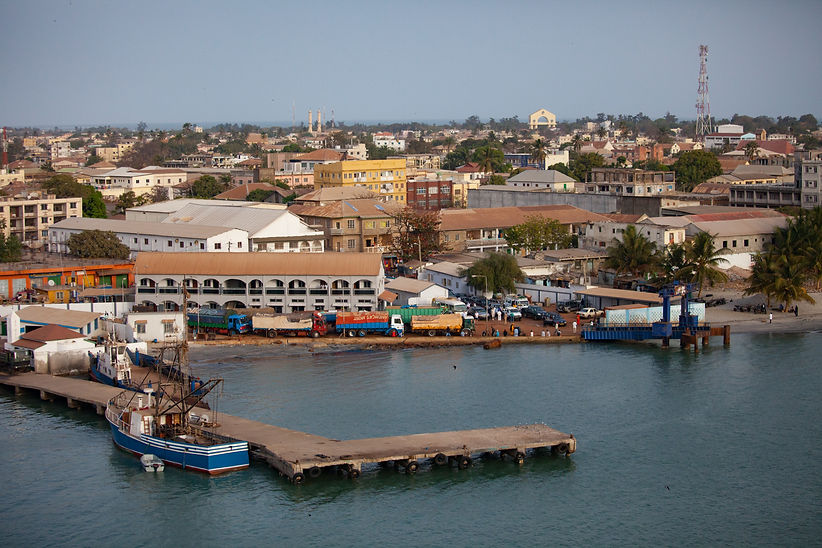
SEASONS AT A GLANCE
Most destinations have different times of the year when they’re more or less popular with tourists.
Peak Season
Shoulder Season
Off Peak Season

BEST TIME TO VISIT GAMBIA
The best time to visit The Gambia is during the dry season , which runs from November to mid-May. This is when you can expect plenty of sunshine and minimal rainfall, making it the ideal time for outdoor activities such as beach-going, wildlife viewing, and birdwatching.
The temperature during this period ranges between 24°C and 28°C (75°F and 82°F) and the humidity is relatively low, making it a comfortable time to visit. Additionally, many cultural events and festivals, such as the Roots Homecoming Festival, take place during this time, providing visitors with a chance to experience the country's rich cultural heritage.
If you're planning to visit during the wet season , which runs from June to October, you should expect higher humidity, rainfall, and a higher chance of encountering mosquitos. While some travelers prefer to visit during this time because of the lush, green scenery and fewer crowds, it's important to note that some roads and attractions may be closed due to flooding.
SAFETY IN THE GAMBIA
The Gambia is generally a safe destination for travelers, but as with any foreign country, it's important to take precautions and be aware of your surroundings. Here are some safety tips to keep in mind when visiting The Gambia:
- Avoid walking alone at night, especially in isolated areas.
- Keep your valuables in a safe place and don't carry large sums of cash.
- Be aware of your surroundings and avoid leaving your belongings unattended in public places.
- Only use licensed taxis and negotiate the fare before getting in.
- Avoid political demonstrations and large gatherings, as they can sometimes turn violent.
It's also a good idea to check the latest travel advisories from your country's foreign office before traveling to The Gambia. Additionally, it's recommended to have comprehensive travel insurance that covers medical expenses, as well as trip cancellations and interruptions.
Overall, if you take the necessary precautions and remain aware of your surroundings, The Gambia can be a safe and enjoyable destination for travelers.
BEST TIME FOR:
Snow Sports
Hiking and trekking
Best Beaches
Kitesurfing: Spot Maps, Wind Season
FIND ALTERNATIVES TO GAMBIA?
Find your perfect destination.
Advanced, real-time destination filter by visa required, region, health risk, travel budget, country value, tourist seasons, best weather and activity or sport.
MORE POSTS ON GAMBIA

WEWILLNOMAD

GAMBIA TRAVEL COSTS
The cost of traveling to The Gambia can vary widely depending on factors such as your travel style, the time of year you visit, and the activities you choose to do. Here are some estimated costs to give you an idea of what to expect:
- Flights : The cost of flights to The Gambia varies depending on where you're traveling from and the time of year. Generally, flights from Europe to The Gambia start at around €300-€500 ($350-$590) round trip, while flights from the United States start at around $800-$1000 round trip.
- Accommodation : The Gambia has a range of accommodation options, from budget-friendly guesthouses to luxury resorts. Budget options can cost as little as €15-€30 ($18-$35) per night, while mid-range hotels can cost around €50-€80 ($60-$95) per night. Luxury resorts can cost upwards of €150 ($180) per night.
- Food and Drink : Local food in The Gambia is relatively inexpensive, with street food and local restaurants offering meals for as little as €2-€5 ($2.40-$6). Western-style restaurants and bars are more expensive, with meals and drinks costing around €10-€15 ($12-$18) per person.
- Activities : The cost of activities in The Gambia can vary widely, depending on what you choose to do. For example, a boat tour up the Gambia River can cost around €20-€30 ($24-$35) per person, while entrance fees to national parks and museums can cost around €5-€10 ($6-$12) per person.
Overall, you can expect to spend around €50-€80 ($60-$95) per day per person on a budget trip to The Gambia, while mid-range and luxury trips can cost upwards of €100-€150 ($120-$180) per day per person.
VALUE RANK:
Find discount flights to gambia, travel tips for gambia.
Here are some travel tips for visiting The Gambia:
- Dress conservatively : The Gambia is a predominantly Muslim country, so it's important to dress conservatively, especially when visiting mosques or other religious sites. This means covering your arms and legs, and avoiding revealing clothing.
- Use insect repellent : The Gambia is a tropical country with a high risk of mosquito-borne illnesses such as malaria and dengue fever. Make sure to use insect repellent, wear long-sleeved clothing, and sleep under mosquito nets to reduce your risk of mosquito bites.
- Negotiate prices : Bargaining is a common practice in The Gambia, especially when shopping at markets or taking taxis. Always negotiate prices before getting in a taxi or buying something at a market to avoid being overcharged.
- Be mindful of cultural differences : The Gambia has a unique culture and customs that may differ from your own. It's important to be respectful of these cultural differences, such as removing your shoes before entering someone's home or asking for permission before taking someone's photo.
- Stay hydrated : The Gambia can be hot and humid, especially during the dry season. Make sure to drink plenty of water and avoid spending too much time in the sun during the hottest part of the day.
- Research local laws : Familiarize yourself with local laws and customs to avoid unintentionally breaking any laws. For example, homosexuality is illegal in The Gambia, and public displays of affection are frowned upon.
- Take caution with street food : While street food can be delicious, it's important to be cautious when eating food from street vendors. Stick to cooked foods that are served hot, and avoid anything that looks like it's been sitting out for a while.
By keeping these tips in mind, you can have a safe and enjoyable trip to The Gambia.
REGIONS & HIGHLIGHTS OF GAMBIA
The Gambia is a relatively small country, but it has a lot to offer visitors. Here are the main regions worth visiting and the highlights of each region:
- Banjul : Banjul is the capital city of The Gambia and a great place to start your trip. Visit the National Museum, which showcases the country's history and culture, and the bustling Albert Market. Also, take a boat trip up the River Gambia, where you can spot wildlife and visit traditional villages.
- Serekunda : Serekunda is the largest city in The Gambia and is home to a vibrant market and a lively music scene. Visit the Abuko Nature Reserve to see monkeys, crocodiles, and various bird species, or take a trip to the Bijilo Forest Park to see monkeys and enjoy a walk on the beach.
- Brikama : Brikama is known for its traditional crafts, such as woodcarving and weaving. Visit the Brikama Market, which is one of the largest markets in The Gambia, and the Brikama Woodcarving Centre to see local artisans at work.
- Janjanbureh : Janjanbureh, also known as Georgetown, is a historic town on the River Gambia. Visit the old colonial buildings and the slave museum, which tells the story of the country's role in the transatlantic slave trade. You can also take a boat trip to the Baboon Islands to see chimpanzees and other wildlife.
- Foni : The Foni region is located in the west of The Gambia and is known for its beautiful beaches and birdwatching opportunities. Visit the Tanji Fishing Village to see traditional fishing methods in action and the Bijol Islands to see the African Spoonbill, which is a rare bird species.
- Kunta Kinteh Island : Kunta Kinteh Island, formerly known as James Island, is a UNESCO World Heritage site and was a major trading post during the transatlantic slave trade. Visit the ruins of the fort and the museum to learn about the island's history and its significance to the slave trade.
By visiting these regions and experiencing their unique highlights, you can get a well-rounded picture of The Gambia and its history, culture, and natural beauty.
WHAT TO SEE AND DO IN GAMBIA
Here are some of the best things to see and do when visiting The Gambia:
- Visit the Abuko Nature Reserve : The Abuko Nature Reserve is one of the most popular tourist attractions in The Gambia. It's home to a variety of wildlife, including monkeys, crocodiles, and numerous bird species.
- Explore the River Gambia : The River Gambia is the lifeblood of The Gambia, and taking a boat trip up the river is a great way to see the country's natural beauty and traditional villages.
- Visit Kachikally Crocodile Pool : Kachikally Crocodile Pool is a sacred site where crocodiles are believed to have healing powers. Visitors can watch the crocodiles up close and even touch them if they're brave enough.
- Experience traditional music and dance : The Gambia has a rich musical tradition, and there are numerous opportunities to experience live music and dance performances.
- Visit James Island : James Island, also known as Kunta Kinteh Island, was a major trading post during the transatlantic slave trade. Visitors can explore the ruins of the fort and learn about the island's dark history.
- Explore local markets : The Gambia is known for its bustling markets, and there are numerous markets to explore, such as the Albert Market in Banjul and the Brikama Market.
- Relax on the beach : The Gambia has miles of beautiful beaches, such as Kololi Beach and Cape Point Beach, which are perfect for swimming, sunbathing, and relaxing.
- Try local cuisine : The Gambia has a unique cuisine that's a blend of African and European influences. Try local dishes such as domoda, yassa, and benachin to experience the country's culinary delights.
By experiencing these activities and attractions, you can get a well-rounded picture of The Gambia and its history, culture, and natural beauty.

WHAT TO EAT IN GAMBIA
When visiting The Gambia, you'll have the opportunity to try a variety of delicious and unique dishes. Here are some of the must-try dishes when visiting The Gambia:
- Domoda : Domoda is a popular Gambian dish made with peanut sauce, vegetables, and meat (usually beef or chicken). It's often served with rice and is a hearty and flavorful meal.
- Yassa : Yassa is a dish made with marinated chicken or fish, onions, and lemon juice. It's often served with rice and is a tangy and flavorful dish.
- Benachin : Benachin, also known as Jollof rice, is a rice dish made with tomato sauce, vegetables, and meat or fish. It's a staple dish in many West African countries, and each country has its own variation.
- Superkanja : Superkanja is a soup made with okra, fish or meat, and a variety of vegetables. It's a nutritious and flavorful dish that's popular in The Gambia.
- Plasas : Plasas is a stew made with cassava leaves, meat or fish, and vegetables. It's a popular dish in many West African countries and is known for its rich and complex flavors.
- Grilled fish : The Gambia is known for its fresh seafood, and grilled fish is a popular dish. It's often served with a spicy pepper sauce and is a simple but delicious meal.
- Bissap : Bissap is a refreshing drink made from hibiscus flowers. It's often sweetened with sugar and can be served hot or cold.
By trying these dishes, you can experience the unique and delicious flavors of The Gambia's cuisine.
LGBTQ IN GAMBIA
I'm a paragraph. I'm connected to your collection through a dataset.

WHERE TO STAY IN GAMBIA
For a first-time visit to Gambia, choosing the right area or region to stay in can significantly impact your experience of the country's vibrant culture, rich history, and stunning natural landscapes. Here are some recommendations along with top-rated accommodation options in different price ranges:
Where to stay in Banjul:
As the capital city, Banjul offers a blend of colonial architecture, bustling markets, and access to Gambia's riverfront. Explore Arch 22, the National Museum, and Albert Market for a taste of local life.
Budget : Ocean Bay Hotel & Resort offers affordable accommodations with easy access to the beach and city center.
Mid-range : Coco Ocean Resort & Spa provides luxurious rooms and amenities with a serene beachfront setting.
Luxury : Kairaba Beach Hotel offers upscale accommodations with tropical gardens and panoramic ocean views.
CHOOSE ANOTHER DESTINATION
Recent blog posts, plan your trip, visa services, let ivisa take the pain out of travel planning and assist you with electronic visas, travel authorizations, visas on arrival, and even paper visas. they can also help with health declarations and embassy registrations. if you're from the us, they also provide a one-stop shop to renew your passport securely and error-free..
FLIGHTS Find a cheap flight by using Sky scanner or Momondo . These are our favourite flight search engines. They index other travel websites and airlines across the globe to easily find you the best deal.
ACCOMMODATION
Booking.com is our number one resource for researching and booking accommodation. In addition to Booking.com , we have found Agoda.com to consistently returns the cheapest rates in Southeast Asia.
TRANSPORT
DiscoverCars.com is a leader in online car rental bookings; we compare car rental deals from many companies so that you can choose which is best for your trip. 12Go connects the world door-to-door, from transfers to flights, under the same user-friendly ticket.
INSURANCE Travel insurance can protect you against unexpecte d illness, injury, theft, and cancellations.
Heymondo (International Travel Insurance)
World Nomads (Travel / medical insurance for long-term travellers and nomads)
SafetyWing Nomad Insurance (Travel / medical insurance for long-term travellers and nomads)
Need more help to book your trip? Check our complete resource page for all the best companies to use when you travel. You will only find the companies we use ourselves.
Please note that some of the links above may be affiliate links, and at no additional cost to you,
we may earn a commission if you end up making a purchase.
Cookies on GOV.UK
We use some essential cookies to make this website work.
We’d like to set additional cookies to understand how you use GOV.UK, remember your settings and improve government services.
We also use cookies set by other sites to help us deliver content from their services.
You have accepted additional cookies. You can change your cookie settings at any time.
You have rejected additional cookies. You can change your cookie settings at any time.
Warnings and insurance
Before you travel .
No travel can be guaranteed safe. Read all the advice in this guide. You may also find it helpful to:
- see general advice for women travellers
- read our guide on disability and travel abroad
- see general advice for LGBT+ travellers
- read about safety for solo and independent travel
- see advice on volunteering and adventure travel abroad
Travel insurance
If you choose to travel, research your destinations and get appropriate travel insurance . Insurance should cover your itinerary, planned activities and expenses in an emergency.
About FCDO travel advice
The Foreign, Commonwealth & Development Office ( FCDO ) provides advice about risks of travel to help British nationals make informed decisions. Find out more about FCDO travel advice .
Follow and contact FCDO travel on Twitter , Facebook and Instagram . You can also sign up to get email notifications when this advice is updated.
Related content
Is this page useful.
- Yes this page is useful
- No this page is not useful
Help us improve GOV.UK
Don’t include personal or financial information like your National Insurance number or credit card details.
To help us improve GOV.UK, we’d like to know more about your visit today. Please fill in this survey (opens in a new tab) .

COMMENTS
The Smiling Coast. of. Africa. With its lush landscapes, vibrant culture, and diverse wildlife, The Gambia is a hidden gem for eco-conscious travellers. As the world embraces sustainable practices, The Gambia has been at the forefront of promoting responsible tourism.
Gambia Tourism and Hospitality Institute (GTHI), was first established as The Gambia Hotel School (GHS) with support from the German Agency for Technical Cooperation (GTZ) and the World Bank, between 1979 and 1981. Learn more Gambia Tourism Board . The Gambia Tourism Authority was established by an Act of the National Assembly in July 2001 to ...
The Gambia may be the smallest country on the continent, but its captivating array of attractions belies its tiny size. Surrounded by Senegal, The Gambia has a mere 50 miles (80km) of coastline, but what a magnificent stretch it encompasses: golden beaches backed by swaying palms and sprinkled with scenic lagoons, sleepy fishing villages and biologically rich coastal reserves.
8. Sanyang Village and Beach. Source: flickr. Sanyang Village. This is a sleepy beach village of about 7,000 people made up mostly of Wolof, Mandinka, Fula, and Jola tribes. Sangyang Beach, which is made up of Paradise, Osprey, and Pelican beaches, is considered by many to be the best beachfront in all of The Gambia.
Gambia Tourism: Tripadvisor has 47,893 reviews of Gambia Hotels, Attractions, and Restaurants making it your best Gambia resource.
Information: The Gambia Tourism Authority was established by an Act of the National Assembly in July 2001 to promote, develop, regulate and oversee the tourism sector in the Gambia. This is comprised of hoteliers, travel businesses and entertainment.The Gambia Tourist Board is also responsible for advising the tourism sector and it offers a one-stop-shop service; the authority is aggressively ...
By gramits. A very competent guide who is very knowledgable about the snakes and reptiles. 7. Fort James Island. 100. Historic Sites. Former colonial fort linked to the control of the slave trading routes. 8. Makasutu Culture Forest.
One of The Gambia's most popular tourist attractions is a sacred site for locals. As crocodiles represent the power of fertility in Gambia, women who… St Joseph's Adult Education & Skills Centre
Gambia. The Gambia is a small, narrow country along the length of the Gambia River in West Africa, almost completely surrounded by Senegal. Besides beaches and wildlife, The Gambia is known for the town of Juffureh, made famous by Alex Haley's Roots. It is known as the Smiling Coast.
The World Travel Guide (WTG) is the flagship digital consumer brand within the Columbus Travel Media portfolio. A comprehensive guide to the world's best travel destinations, its print heritage stretches back more than 30 years, with the online portal reaching its 20-year anniversary in 2019.
Gambia Tourism Board. Visit NCAC . National Center for Arts and Culture. Visit Policies and Strategies: The Gambia Arts and Culture Policy. 2018. Tourism Culture Hospitality Strategy Plan. 2015 - 2020. The Gambia Tourism Business Plan. 2010. Home; The Republic Menu Toggle. About The Gambia ...
The Government of The Gambia requires visitors to obtain a visa prior to or upon entering the country. The fee for a Gambian visa issued through the Gambian Embassy in the United States is currently $200 but is subject to change. Alternatively, tourists can apply for a visa upon arrival in The Gambia.
Fast Facts About Gambia. Climate: Get ready to bask in Gambia's tropical climate! The sun is a regular visitor, with temperatures ranging from 25°C to 35°C (77°F to 95°F) throughout the year. Rainy season arrives from June to October, so an umbrella might come in handy. Local Currency: Gambian Dalasi (GMD) is your go-to currency.
Things to Do in Gambia, Africa: See Tripadvisor's 47,889 traveller reviews and photos of Gambia tourist attractions. Find what to do today, this weekend or in September. We have reviews of the best places to see in Gambia. Visit top-rated & must-see attractions.
Ministry of Tourism and Culture The Gambia. 3,003 likes · 2 talking about this. The Ministry of Tourism and Culture of the Republic of The Gambia is responsible for the promulgation of the...
the Foreign, Commonwealth and Development Office including information on safety and security, local laws, currency and health. so please check regularly for updates. The Gambia Experience, Atlantic House, 3600 Parkway, Solent Business Park, Fareham, Hampshire, PO15 7AN. Our Gambia travel guide is full of fantastic information to prepare you ...
The Gambia Tourism Board is the institution mandated by Government to promote The Gambia as a Tourism Destination What type of tourism is offered ? It caters for all tourists (nature lovers, Bird watching, Trekking, leisure and Exotic, water sports and fishing enthusiast) etc
Most travellers to The Gambia will have pre-arranged hotels booked as part of a package. However, it is possible to travel independently, providing you stay away from the resort hotels used by the tour operators. There are a growing number of riverside ecolodges up country. At the budget end, there are a few tourist guesthouses and homestays.
Activities: The cost of activities in The Gambia can vary widely, depending on what you choose to do. For example, a boat tour up the Gambia River can cost around €20-€30 ($24-$35) per person, while entrance fees to national parks and museums can cost around €5-€10 ($6-$12) per person.
About FCDO travel advice. The Foreign, Commonwealth & Development Office (FCDO) provides advice about risks of travel to help British nationals make informed decisions. Find out more about FCDO ...